#and like on a character analysis level that is very interesting
Explore tagged Tumblr posts
Text
Leona and a representation with love topics (female & male)
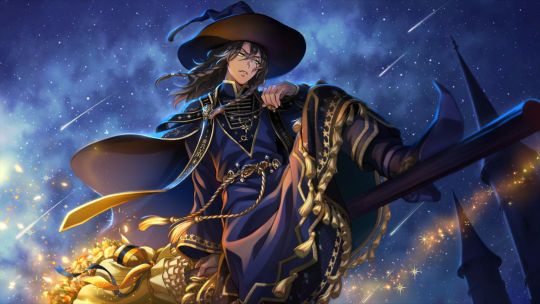
Everything said on this analysis is just a personal opinion, I don't mean to offend nor step on someone else's view or headcanons. Thanks to @/Viperkun to translate it.
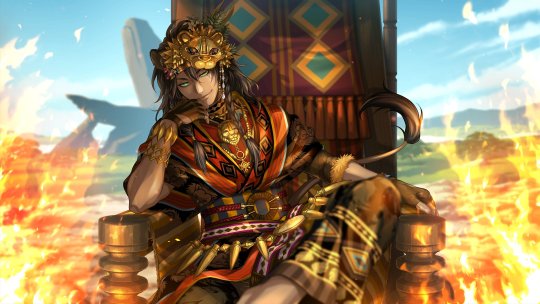
First of all, we need to start from the basics and ask ourselves, Who is Leona Kingscholar? Leona is a complex character, filled by development which not everyone sees through or most of the time tends to not notice. He's a character that tends to have high expectations over a depression pretty deep and prolonged, there´s many themes regarding those feelings of inferiority, demotivation and many others, which leads to his self sabotage. However, at first glance he doesn't allows himself to feel pity towards others due to his own high ego and pride, he's a man that despite finding his own life pretty unfair, keeps going on in his own way and stipule.
Now, how would this affect his romantic relationships? The answer may change depending on the person who is by his side, this includes gender. Leona is very polite towards women since he's from a country which prioritizes them, they're stronger and bigger than the usual males from the same country, and so, even if women doesn't really fit this kind of criteria, he's still going to be respectful towards them.

No, he wouldn't be a role model prince (as an example, Eliza, with who he shared a few words one on one, then nothing more), but he's not going to have thoughts or actions that could be considered nor even be close to the category or definition of "incel".
He's not someone who overpowers by his strength or title over women; yes, he speaks with sarcasm, cynicism, and teasing is his second language, but he would never start any situation in which he would make someone uncomfortable or even less put someone at risk or danger (Overblot aside, since Yuu has no specific gender. If that was the case and Yuu was a girl -just like Savanaclaw's manga Yuu-, it's not that Leona decided to have a breakdown due to her or to hurt her, it was something out of his control due to circumstances)
In the case we talk about a boy, it wouldn't be too different from how we see Leona acting towards the rest of the twst cast in game; maybe the level of respect would lessen just a bit to talk in a bolder way we can consider as you to you.
I want to clarify that I'm not saying Leona is a bully towards a romantic male interest, just that he would probably have more fluid talks through a mutual understanding by sharing similar biological features if we put emotional and psychological sides apart, Reiterating it wouldn't be too far from his canon interactions with the original cast. Regarding my personal opinion (as well as this post is) I don't see Leona as someone who uses petnames with his romantic interest, at least not early into the relationship (established or not)
I know, there are many who have seen him or portray him as someone who would use nicknames as "my love", "darling", etc, and I don't invalidate any of them, though I can't really see them coming from someone who's stoic and serious most of the time. "Love melts even the coldest of hearts", yes, however it's complicated relating this through a romantic or platonic relationship with Leona, it's a bit complicated and takes some time.
As I mentioned before, he's a man with issues,problems which were born from deep insecurities and an inferior complex too huge to make them disappear all of a sudden just for love. It's a slow process, I'm not saying that he's going to be toxic once he gets into a relationship just that as many others the relationship would take more time and it's going to be complicated to finally establish it. The first phase of Leona being in love is denial, his main goal won't be focusing emotionally on a person, however, if he falls through this thought he would probably and mostly spend his time with said person; not being a man who would easily please someone with words, let's remember his brain tends to go under the logical side of things rather than emotional.
Even so, he's a man who's predominant love language (at least through this phase) is gift giving. Leona is a smart and sharp-eyed man, knowing at least a bit of the interest of the ones around him (Just look at Idia's second birthday card in which Leona gives him a chess set or how in more than on ocassion he gives Ruggie different things without him asking him to do so under their agreement of basic services; even when he gives a salad to Riddle or a pen to Vil, despite being unnecesary objects, and most of them being related to more of a silly/fun kind of interaction, they exist to let you know that he remembers those special days, he knows what to do, he is a man that sees and most importantly listens to his surroundings). Even if Leona's romantic interest doesn't mention they don't want anything Leona would read that somehow, he'll give it a meaning and provide surprise gifts through different kind of occasions for no apparent reason (money isn't a problem for him).
Moment of interlude, appreciate the kitten:

Ok ,let's continue. Once the relationships progresses, PDA will make it's entrance. Leona would be pretty clingy with his loved one, letting his own scent on them to let the others know that he was there first. Don't misunderstand nor mistake this as the kind of a response from a toxic or possessive person, he knows when to give space and how, even he needs it, but that doesn't mean he would let his lover go around without their clothes having the slightest of his scent on it.
He enjoys to take naps on his lover's lap, or even sleeping while embracing them. If we focus on a more natural-like related environment, lions tends to demonstrate their care to others by caressing each other's heads with their own, caressing their fur and also leaving some love bites; it wouldn't be much different here.
Personally I can see Leona giving love bites as a sign of affection; bites on the cheeks, shoulders, hands or neck (this without leading to a sexual side), leaning his head against his lover's one, or their shoulders if they're hugging, lazy little kisses around their face. I've read that when it comes to a girl, Leona would even ask for permission for a kiss, again related to the topic of consent and respect, to which I agree being someone who would ask for permission without words but actions, subtle, around two or three that would feel more than enough for him.
I don't see Leona jumping over or around someone to express his love through the first months into the relationship, he would be patient, testing the waters to see if this person isn't playing or making fun of him and his trust, something that has happened with other characters from the cast.
Please don't misunderstands my words, I've said before that he would ask for consent if his partner was a girl, but this works in case his romantic interest is a boy too, I just see him being more teasing with the last example.
Conclusion: Leona would never be categorized as a toxic man that would use his strength or status over someone he loves. Even if he ever could do so, the most possible scenario is an accidental one and he would make sure to apologize if he mistreated or make his partner uncomfortable. Leona isn't someone that would be afraid of apologizing when he knows he has done something wrong (we can see this during Tamashina Mina and how he apologizes to Jack by not thinking about how the hot weather would affect him since he wasn't from the same place as him). This also doesn't means that he would leave his pride aside, all he has is his own pride anyways, for good or wrong.

He's a responsible man, attentive, someone who wouldn't be the best at using cliche or romantic words at first; but everything will change with time and a slow development, overthrowing the bad times that he could experience as a partner while evolving into someone capable to keep a relationship of respect and lots of mutual and understanding love.
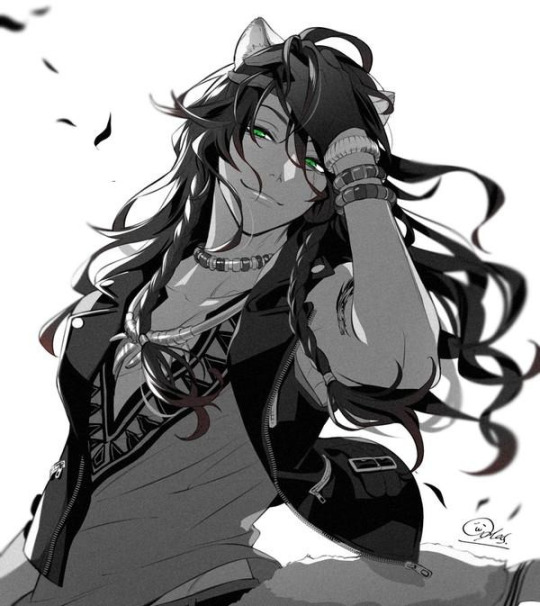
#twisted wonderland#disney twisted wonderland#twst#twst leona#twst leona kingscholar#twisted wonderland leona#leona kingscholar#disney twst#just an friendly analysis#PERSONAL OPINION#None of this has been intended to provoke headcanon war#I'm just tired of Leona being portrayed#as a violent person
47 notes
·
View notes
Text
#absolutely brilliant analysis of mike wheeler #it's kind of interesting to see a show that contrasts what we normally see in these types of shows and movies #you think about marvel movies and most of the time it the characters do brute force there way to victory like nancy #or we get characters who MAKE their solution like tony stark with his iron man suit similar to dustin #nancy will go in there with the intention of just blowing everything to bit with a gun #dustin will take his logic and prior knowledge and apply it#like with the compasses #but in a situation where they don't have el to do the heavy lifting for them #they both fail #because their enemy isn't a mindless body #vecna is extremely intelligent #he is powerful physically and uses psychological warfare#he has a hive mind and a strategy #and the hawkins crew fail to do more than weaken him once el had him subdued #and they lose eddie in the process #they were missing two key components#mike and will #mike is intelligent but in a different way to dustin #mike is a problem solver #he recognizes patterns and is very observant #he thinks ahead and plans accordingly#he asks the logical questions #and will has the experience of dealing with vecna on a deeper level #will knows how vecna thinks#has a deeper connection with him that will be explored in s5 #can sense when vecna is near and basically act as an alarm system for the crew#he has an understanding that the hawkins crew does not #all the characters talk about how el is what they need #but el can only do so much#i think it will probably be el that deals the final blow in s5 (@clericsandpaladins)
You get it. Hell yeah, you get it👏👏👏
Mike is the party’s problem creator, and that is why he is so vital to the party's success.
Let me explain.
I’m not talking about him creating real problems. I’m talking about D&D.
Mike is the dungeon-master. He creates plot. He creates opponents. He creates problems and snares and tricks for the other players to face. We even see in one of the tie-in comics that he plotted out a campaign specifically with the intention to give Will the chance to feel like a hero instead of a victim (the Thessalhydra campaign) after his trauma in the UD, which mean he had to consider skills, inventories, weaponry, opponent strengths and weaknesses, and more, all to funnel toward a scene where Will gets to kill the Thessalhydra without making it obvious and patronizing.
So when it comes to making plans regarding the UD, Mike is brilliant and he is necessary. He’s the one who figures out El is taking about an alternate dimension because he thinks outside the box and isn’t hindered by conventional logic. He considers all sides. He’s the only one to view Will’s True Sight as a power that allows him to become a superspy—a change in perspective that helps Will save Hopper and in turn saves Hop, Joyce, Mike, and Owens at the lab. Only Mike knew Will was a spy and needed to be sedated, and if he hadn’t been there, Spy!Will would have known where they were at all times and the demodogs would have killed them all. Not only that, but he came up with the shed plan and was the first time bring up that closing the gate would kill Will.
Dustin is the one who proposes they distract the demodogs for El and Hop, but here’s the problem. His plan to lure Dart to the junkyard and Steve’s input on this plan—inspired by what he’d seen Nancy and Jonathan do in s1 with the gasoline trail—took forever. It was a smart plan, but it left them incredibly vulnerable and trapped in a small space, and in the end required Steve to go out into the open. It didn’t account for the possibility that there might be more demodogs, and it left part of the bus (the top hatch) exposed. It also doesn't account for an escape plan.
It’s very similar to what they do in s4 with Eddie’s trailer in the UD: fortify, lure, hide. Except they forgot to account for the vents (like the top hatch) and in the end, Eddie ran out into the open and was overwhelmed by the sheer number of the demobats. The main difference is that they did have an escape route (the trailergate) except they don't have the ability to close the trailergate, so they're still vulnerable.
So while we don’t know what Dustin’s plan would have been to distract the demodogs if Mike hadn’t been there, we still know that they needed Mike’s knowledge of the hive mind and the tunnels and the weakness to fire (beyond just a general “oh fire is a good weapon” knowledge like Nancy and Jonathan stumbled into in s1 and that Steve tried to replicate in s2, but a for-sure “fire is its weakness” knowledge that Mike gains at the lab) in order to pull off this plan successfully. Dustin’s idea to distract and his emotional connection to Dart in particular protects them, but Mike’s knowledge and outside-the-box thinking is vital. It’s likely that he’s even the one to make them all wear goggles and bandanas because he probably saw Hopper coughing and wheezing after prolonged exposure to the toxic air and knew that he’d needed to be hosed down at the lab. His plan is also a get-in-get-out plan, meaning he intended for them to get in, wreak havoc, and then immediately get tf out safely. Mike plans for after the attack as well.
In s3, Mike knows they need to act as fast as possible in regards to Billy because he has experience with a Flayed individual—the only one out of the kids’ party other than Will who actually experienced Will being Flayed. All the other kids only showed after he’d already been sedated, and only Mike was in the shed with Hop and the Byers once he woke up (and then and to be sedated again). Everyone else doubts, everyone else hesitates, but Mike and Will know they need to act now—they can’t sit and wait for information, they need to create a scenario to give them information. So Mike creates one: The Sauna Plan.
This isn't to say that Dustin isn't smart! He's incredibly intelligent! But Dustin is more science-minded and doesn't think outside of the box as naturally as Mike does. And this is why they're most successful when they work together.
Dustin has a ton of D&D knowledge, but he doesn’t really apply it until prompted. I can think of at least 2 instances where Mike describes a supernatural occurrence in detail and then Dustin names it with a D&D reference. Mike explains what he thinks El means by flipping the board over and he suggests/describes an alternate dimension, and then Dustin says, “like the Vale of Shadows.” In s2, Mike describes in detail the hive mind and how it works, and then Dustin says, “like the Mind Flayer.” Dustin is able to label but he doesn’t understand before being able to label it like Mike does. In fact, Dustin doesn't question why Vecna is creating the gates until Erica prompts it – if Mike had been there, this question would've undoubtedly been prompted much sooner because Mike asks a billion questions all the time (for example, "Why would he give me a pen that doesn't work?")
Dustin and Nancy actually approach problems in a very similar way. When Nancy encountered the Demogorgon in the UD, she started looking through a science book to rationalize it in terms she understood. Dustin did the exact same thing when he found Dart – he went to the library and did research on amphibians and pollywogs. Both times, they found valuable information! Nancy was able to figure out that the Demogorgon was attracted to blood and Dustin figured out that Dart would continue to molt and is heat-sensitive. But in s2, Mike is the one who took Will's knowledge and experience seriously and accepts right away that Dart is from the UD, and treats Dart as a serious potential danger even before they know he's a demodog.
Nancy is also incredibly intelligent, and she's a fighter through-and-through. I adore her! But here's the thing about Nancy: she hates feeling powerless. She hates being emotionally vulnerable in a way that makes her look weak. She can be emotionally vulnerable in an affectionate way and be okay with that! But she hates being vulnerable in a way where she feels hurt and scared and grieving, and when she feels this way, she feels the intense need to Immediately act and stomp out what’s making her feel that way. We see it in s1 where after she learns about Barb’s death, she wants to immediately go back and kill the Demogorgon.
Nancy prefers the direct approach, even when that's not the best choice. Her choosing the direct approach against Vecna required a lot of time they didn't have trekking across the UD, and it didn't account for what would happen if they got snagged in the vines. In fact, her approach is very similar to Hopper's in s2 when he goes to the tunnels for the first time! He chooses to be direct and it nearly kills him because he didn't plan for backup and can't free himself from the vines without external aid.
And the more I think about it, the more I suspect that Vecna gave Nancy the vision of his plan and her family dying specifically to make her emotionally vulnerable and therefore impulsive and brash and direct.
And in s4, we see what happens when Mike isn’t there to challenge Dustin's logical, science-based thinking and Nancy's direct, brash attack style – when Mike isn't there to present outside-the-box thinking and see the problem from all angles:
The demobats get into the "fortified" trailer, Eddie goes out into the open and dies, Nancy & Co. get immobilized by vines, they only prepared one music source for Max and so when her Walkman is destroyed, she's wholly and utterly vulnerable, and if it weren't for El piggybacking from the other side of the country, she would've died permanently.
The one time Mike isn't in Hawkins, they fail.
Mike, the dungeon-master, is a problem creator, so he is vital to the party's ability to solve problems.
53 notes
·
View notes
Text
Sometimes I am reminded of the fact that Iorveth just like canonically has very pretty eyes (or very pretty eye 😔).
In TW2, none of the men have eyelashes while the women do. As examples for the men, we have Geralt himself, Letho, Dandelion, and Roche:
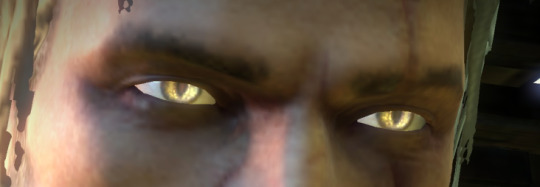


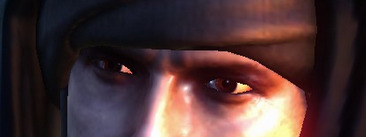
And as examples for the women, Triss, Saskia, Sheala/Síle, Philippa, and Mottle.



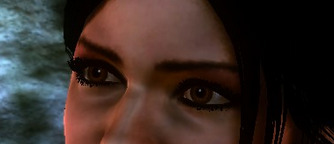

However, Iorveth does have eyelashes on his in-game model:

This is unique to him, not an elven trait, because as we can see on Cedric, Ciaran, and Ele'yas, they don't have eyelashes like Iorveth does:

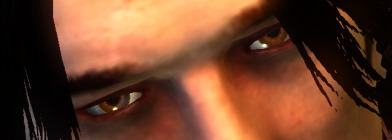

And it's not a fluke or graphical glitch on Iorveth, either, he consistently has them throughout the game:


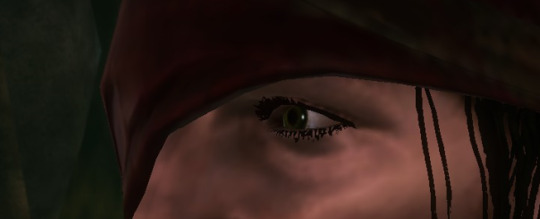


He's just really pretty like that.
#rambles#the witcher#the witcher games#iorveth#catch me looking at insignificant details because i spend too long staring at elves#yaevinn pencils his brows and iorveth has really nice lashes#and like on a character analysis level that is very interesting#not only was his eye something vital to him#he's an archer#he needs his vision#he would have had to relearn how to shoot with this impairment to his depth perception#but not only for it to be a practical thing#it's also like#something about him that is markedly beautiful#only to be bespoiled by the dh'oine#everything elven and beautiful must be tarnished by human hands#and so they took his eye#not that i think iorveth is particularly vain#but he is still proud in his own way#and it must sting to lose a point of pride#his marksmanship and his beauty both marred by the dh'oine#he's still very striking and he can still shoot a bow so it cannot be said that these things were 'ruined'#but it's just kind of adding insult to injury#as it were
229 notes
·
View notes
Note
*sigh* thoughts on Nintendo's botw/totk timeline shenanigans and tomfoolery?
tbh. my maybe-unpopular opinion is that the timeline is only important when a game's place on the timeline seriously informs the way their narrative progresses. the problem is that before botw we almost NEVER got games where it didn't matter. it matters for skyward sword because it's the beginning, and it matters for tp/ww/alttp (and their respective sequels) because the choices the hero of time makes explicitly inform the narrative of those games in one way or another. it matters which timeline we're in for those games because these cycles we're seeing are close enough to oot's cycle that they're still feeling the effects of his choices. botw, however, takes place at minimum 10 thousand years after oot, so its place on the timeline actually functionally means nothing. botw is completely divorced from the hero of time & his story, so what he does is a nonissue in the context of botw link and zelda's story. thus, which timeline botw happens in is a nonissue. honestly I kind of liked the idea that it happened in all of them. i think there's a cool idea of inevitability that can be played with there. but the point is that the timeline exists to enhance and fill in the lore of games that need it, and botw/totk don't really need it because the devs finally realized they could make a game without the hero of time in it.
#i really do have a love-hate relationship with this timeline#because it's FASCINATING lore. genuinely. and i think it carries over the themes of certain games REALLY well#but i also think it's indicative of a trend in loz's writing that has REALLY annoyed me for a long time#which is this intense need to cling to oot#and on a certain level i get it. that was your most successful game probably ever. and it was an AMAZING game.#and i think there's definitely some corporate profit maximization tied up in this too--oot was an insane commercial success therefore you'r#not allowed to make new games we need you to just remake oot forever and ever#and that really annoys me because it makes certain games feel disjointed at best and barely-coherent at worst.#i think the best zelda games on the market are the ones where the devs were allowed to really push what they were working with#oot. majora. botw. hell i'd even put minish cap in there#these are games that don't quite follow what was the standard zelda gameplay at their time of release. they were experimental in some way#whether that be with graphics or puzzle mechanics or open-world or the gameplay premise in its entirety. there's something NEW there#and because the devs of those games were given that level of freedom the gameplay really enforces the narrative. everything feels complete#and designed to work together. as opposed to gameplay that feels disjointed or fights against story beats. you know??#so I think that the willingness to allow botw and totk to exist independently from the timeline is good at the very least from a developmen#standpoint because it implies a willingness to. stop making shitty oot remakes and let developers do something interesting.#and yes i do very much fear that the next 20 years of zelda will be shitty BOTW remakes now#in which botw link appears and undergoes the most insane character assassination youve ever seen in your life#but im trying to be optimistic here. if botw/totk can exist outside the timeline then we may no longer be stuck in the remake death loop#and i'm taking eow as a good sign (so far) that we're out of the death loop!! because that game looks NOTHING like botw or oot.#fingers crossed!!#anyway sorry for the game dev rant but tldr timeline good except when it's bad#asks#zelda analysis
165 notes
·
View notes
Text
augh who up feeling like they should be humanely euthanised for liking media the wrong way... sorry for fandomising certain characters but not fandomising others enough in the right way.
#ive noticed the wbg fandom has a very different way of interacting w the source media than like. dndads#both are similar in some of the fandomising of characters#specifically like funny characterisation stuff#but when it comes to more complex stuff like angst it feels like the wbg fandom approaches from a different layer#eg in dndads just a characters death is seen is sad but for wbg a lot of the time theres more to it...#an extra layer. a more complex flavour. the horrors are not just those experienced but the entire surrounding situation.#like edgars death isnt sad#i mean. its not sad in the way that referencing it in art will get any attention#but TJ's death is devastating!#with notable exceptions of course. eg innocent hunter and like everything about him#i find that i tend to approach media more stylistically and appreciating the DRAMA which i can mine for visuals#and then in my art i try to challenge myself to translate those vibes#like picking at a thread that is already present. an angst or dynamic already present and explored briefly#but wbg fandom tends to lean more towards analysis? which makes the way i engage feel a bit surface level#like in wbg fandom i dont think i can do the eqiuvalent of all my angsty glenn close art#also i just noticed. the characters in wbg are really interesting because you THINK they#wouldn't be very fandomised. that theyd be treated within the show as more like characters that exist to push the plot forward#but then certain characters act as very fandomised versions of themselves in canon#and are treated as their one trait in the qnas too!!#its like theyre almost dndads characters in this way. but without even that extra layer#the second heat that even like henry oak has! like henry's a hippie but he's also stinky and cringe and is repressing so much shit#but marissa is just explosions girl#i guess that's maybe cuz many characters in wbg arent main characters but in dndads they all are#BUT EVEN NPC HERMIE. HIS LAYERS.#very interesting
9 notes
·
View notes
Text
I know multiple of these are likely important to people, but I'm asking in terms of like - which of these do you tend to focus on the MOST, enjoy the most, that is most essential for you to actually care about the media, etc.?
(For example: someone finding "Relatability" most important would likely not enjoy a show much if they have trouble empathizing with the characters/relating to it, even if it were good otherwise. Or, someone might be able to overlook bad acting and ugly costumes, as long as the Character Dynamics are fun to them, because they value that more than Aesthetics- while for others, bad costumes would be a dealbreaker.)
Also feel free to reblog and explain your answer or more information in the tags- I've always been curious about people's relationships to media, how they conceptualize it/what they get out of it, how some people value some parts more than others, how that informs their overall taste and genres they may be more inclined towards, etc. :0c
#I was having a conversation with a friend about our favorite type of media and they said the reason they DON'T like historical or fantasy#media or etc. is because they can't imagine themselves being in those situations like it's too detached from anything that they can relate#to personally. they put themselves in the shoes of the characters and apparently like feel emotions while watching stuff and actually#get into the way the characters are feeling so they kind of judge how 'good' or 'bad' a show's writing/setting/etc. are by how it makes#them feel and if they think the characters reacted realistically based on what they were feeling in the moment/what in their head they#would be feeling if they were in the postion of the character. SO apparently the distance of it being in an unrelatable setting or too#detached from our reality makes it harder for them to relate to and less able to really engage with it on that level. WHEREAS I watch#things exclusively in a very like.. detached way?? I'm INTERESTED.. it's like im intellectually analyzing everyhting that's happening and#can be intrigued by events but it's not in an emotional way? More of like a distant 'intellectual curiosity'. Maybe the premise or the#aesthetics or something about it has piqued an interest for me to observe it. to see what it's like or how it plays out. how the idea#is executed or etc. But like.. I cannot remember EVER really relating to any character or situation or projecting onto a character#or having those sorts of feelings or investment in it. That is just not a central part of why/how I watch things or what I care about#BUT after this I was thinking maybe this is my disconnect? I do not seem to conceptualize media the way some other people do and I often#walk away with an entirely different take on things. etc. So I wonder if maybe it's part of how everyone values different things probably?#maybe I literally just watch stuff and percieve it from a different frame of mind that others. More of a like detached curiosity#vaguely bemused analysis mode. Instead of a 'I am deeply emotionally invested in this and am feeling for all the characters' mode#And also I bet people who care more about plot/story are also the people who mind spoilers. Whereas for me I literally seek out spoilers#intentionally because that element of 'suprise ooh what will happen next!' is not central at all to my enjoyment. I could know literally#everything that will happen and still can find it interesting to observe - since for me#that's not the point. I'd rather know the ending so I can determine whether I want to invest the time in it in the first place. etc.#ANYWAY!! If I had to choose - I would say I'm usually heavily focused on world details and aesthetics. With only a slight preference#towards characters individually being interesting. Group dynamics can sometimes be okay but I get tired of everything being about relations#hips and romance - especially when sometimes it seems to be like. people who could not stand on their own as a character/are fundamentally#boring otherwise lol. I would watch a series of just one guy locked in a closet talking to himself as long as he was interesting and saying#things that were amusing or notable for some reason lol. I actually tend to dislike plot because most 'plot heavy' things like action focus#ed shows ALWAYS feel to me like they're moving so fast just to get from one thing to another that I'm not getting enough details. Part of#why I tend to not like movies. the time limit makes them too quick. I need a 95 hour expostion dump of the history of the entire world#and a series of 17 episodes straight where a guy is trapped in a room & the audience is just psychoanalyzing him. hghj.. Maybe I find all#characters annoying/unrelatable bc people w my personality type make bad characters/are not often represented (or are done BADLY). so then#I'm just picking 'who is the LEAST insufferable? who could i study like a lab rat?' whilst my main focus is the worldbuilding&costumes lol
76 notes
·
View notes
Text
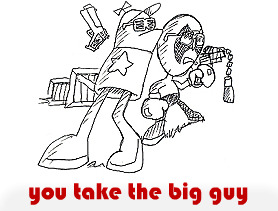
[image description: black and white sketch. dangeresque, further in the background, points his nunchuck-gun forward in a wide stance. dangeresque too, in the foreground, leans back on his feet & points his own gun in the air. they both look seriously to the right at an unseen target. at the left are some crates in the background. the caption is red, blocky & curvy text, reading "you take the big guy". end image description]
i honest to god put more stock into the relationship between these double-fictional characters than sb & hs themselves sometimes
#the implications man the implications#i read that one comic yes and i think the honest to god nice level the dangeresque two's relationship is built upon is. so fun#i will analyze that in another post. this post is for me to say. i really like it#god what if i wrote a story. see i really like the idea of stories where sb has to confront the beings from his own creations#in a messy & extremely freudian manner#so one where he meets up with the cast of dangeresque would be fun to make. i can imagine it#if cutsey/sultry buttons craig & strong sad's misc brother characters are any indication there is a good deal of actor influence#in the cast's realization as characters. i mean like bubs & the kot & pom pom & the poopsmith play their parts pretty straightforwardly#but let's face it. sb can come up with very nice concepts but he can't do super varied character types.#the rest of the cast are responsible for much of the variety in the actual character trait department. he makes up the drama fine#okay i said i wouldn't do analysis in this post. my point is a fcusa/dangeresque cast meetup would be interesting#because some of them are direct strong bad products & there'd be some people dealing with#yep yeah i figured out that's how sb views me while i was playing that character. or even just yep i'm not like that at all#meanwhile others would be like man it sure is nice how i'm not actually like that but it kind of hurts how sb views me so#and yet others would be like say strong bad since dangeresque & dangeresque too are getting up to some stuff right now#wouldn't it be so cool if we also did something. so that they could see their progentitor-types have also got epic things going on#god ask me about this again at a time not so late at night okay. and also once i've had more time to think about it
2 notes
·
View notes
Text
Time to talk an unnecessary amount about floors!

Episode 6 of Dungeon Meshi was produced in collaboration with a smaller studio, Enishiya - and it went way harder than I expected, for being made up of two relatively simple and self contained stories focusing on one character each.

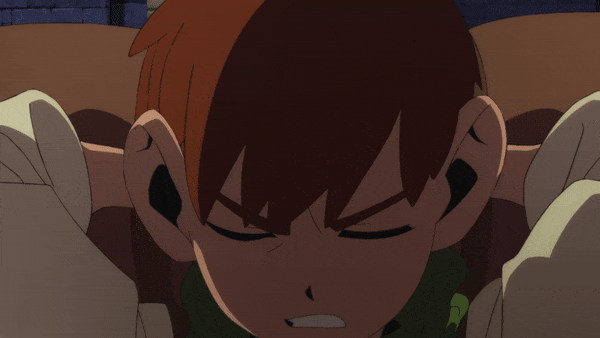
And you can really see how those extra resources meant the animators could give full focus to both halves of the episode. Let's take a look at one piece that stole the show.
The first half was handled primarily by episode director/storyboard artist Keita Nagahara and co-animation director Hirotoshi (or Hiroaki? [1]) Arai. It's actually kinda insane how much of this section can be attributed to these two.
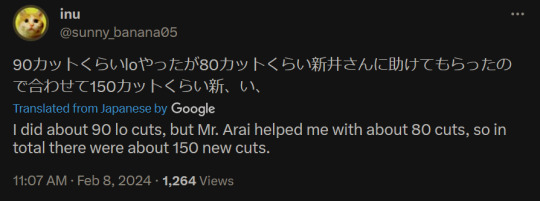
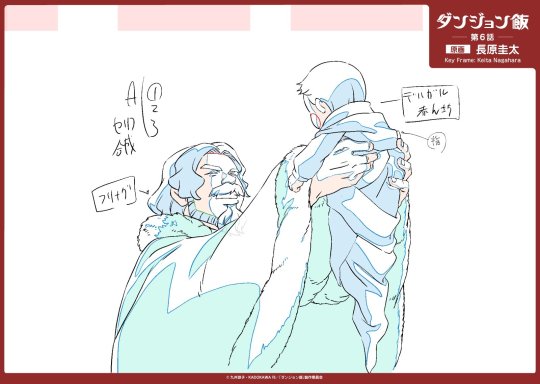
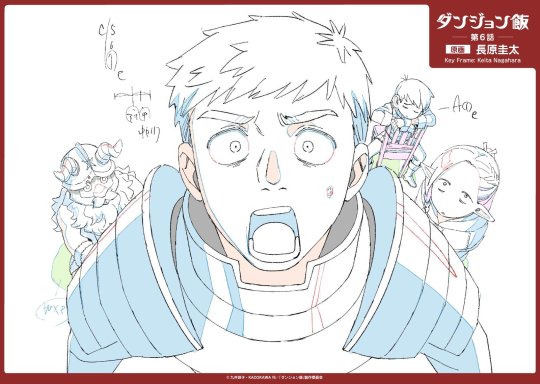
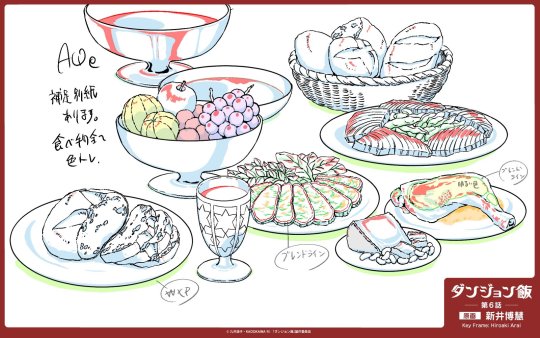
But the real star of the show is the second half, Chilchuck vs the mimic, led by co-animation director Toya Ooshima in his first animation director role for TV anime!
And the biggest aspect that knocked my dang boots off was something that's very consistent with Ooshima's style: background animation!
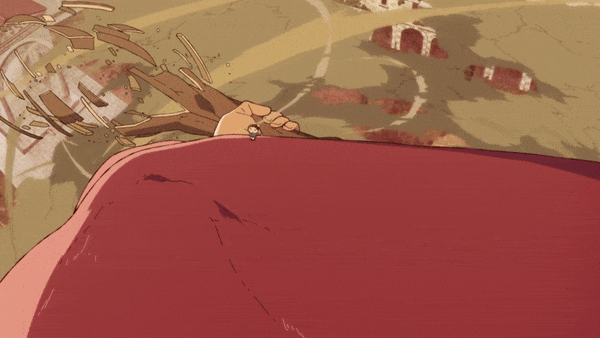
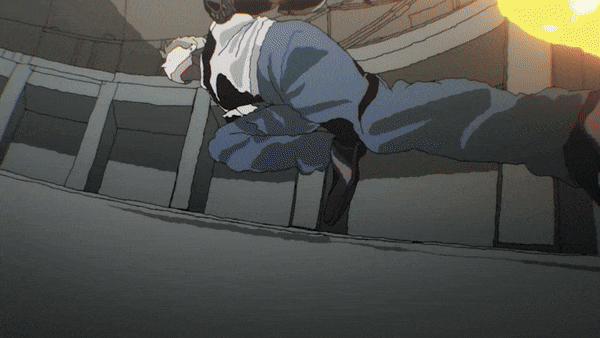
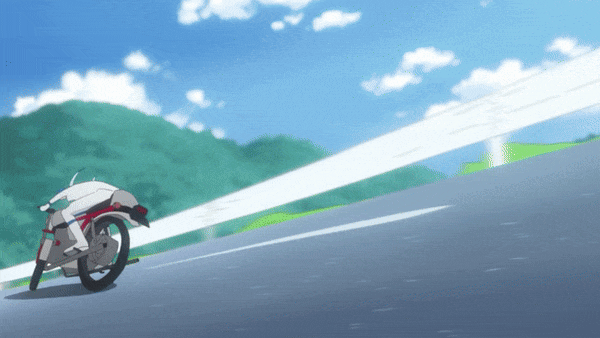
By animating the backgrounds rather than using painted still images, Ooshima and the team of other similarly skilled animators are able to create these beautiful dynamic camera movements that wouldn't be possible otherwise. Like these cuts by Takeshi Maenami where the camera becomes an expressive part of the scene, zipping forward and backward, and tilting to emphasize the speed of this murderous hermit crab. (Maenami's style is also very recognizable here - snappy timing and quick camera movements)


Or this cut by the incredible Kaito Tomioka which cleverly combines a traditional background for the walls with a fully animated floor. The level of detail in these tiles is just completely insane, and used to great effect with this wide, diagonal angle, and the way the camera tentatively drifts forward before reversing direction, and the tiles blur out as it speeds up.

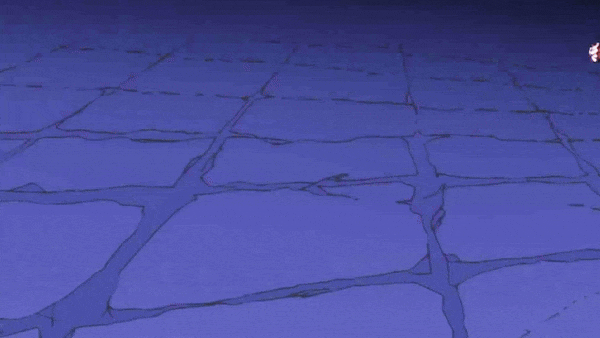
I don't think I'm the only one caught off guard by how much they full-assed this little side story, but it was a pleasant surprise!
I broke down the entire episode in this video here. A lot of research went into this one, and I think it's the best one of these videos I've made so far, so if you're at all interested in more of this type of analysis in video form, I would really appreciate it if you checked it out, or re-blogged this post! Thanks
youtube
[1] It's listed as Hirotoshi on Anime News Network, but Hiroaki on a key frame that Studio Trigger shared on Twitter, so I'm not sure which one is wrong.
#dungeon meshi#animation analysis#studio trigger#laios touden#chilchuck#video#original#mini essay#Youtube
17K notes
·
View notes
Text
[SPOILERS] Homicipher Is Actually Romantic, Convince Me Otherwise [Analysis/Opinion] [SFW]
Word count: 3,332
Edit: 11/7/2024
[Feel free to skip to the last objective "Individual route discussion + what made it romantic" if you want to get straight to the point]
Homicipher is truthfully a romantic (or platonic) game. It is a game that has to be looked at from a different perspective when it comes to love/romance. A game where you have to take in consideration of the characters and the nature of their 'other world'. Today's post will discuss into what I believe made Homicipher an oddly, but romantic game, despite its shortcoming and abrupt ends.
⚠️[MAJOR LORE/CHARACTER ROUTE SPOILERS] ⚠️
Discussion Objectives:
Definition of Love & how it plays into Homicipher
The nature of the 'other world' and ghosts
Individual route discussion + what made it romantic (thoughts)

What Is Love & How Does It Play Into Homicipher?
Love has many layers of definition and associations. Maybe, that is why some may deem Homicipher to be "unromantic" and some disagree on that thought. It also varies based on the type of content/exposure you had consume in the category of love [whether romantic or platonic]. Socially, from a common standpoint, love is a strong attachment or affection for someone. Often from a social standpoint associated with dates, affection, and intimacy. However, love is always changing, since it is a social script on what its suppose to be, and changes as society progresses. Some notions stay the same but some begin to change (just like how language and certain concepts begin to change in the other world, a different society from our own). For the sake of a "true" definition of love. I will be using the definition offered by the Oxford Language Dictionary. So, what is love?
Love as a noun is...
"An intense feeling of deep affection"
"A great interest and pleasure in something"
"A person or thing that one loves"
Love as a verb is...
"Feel deep affection for (someone)"
"Like or enjoy very much"
Not long after its release there had been a fair number of comments/reviews criticizing Homicipher for its lack of romance. This claim is NOT entirely wrong. From the expectations of a "normal" Otome/dating sim it doesn't necessarily meet the requirements because of its lack of intimacy, affection and interest from a HUMAN/SOCIETAL perspective. We must remember that romance/love does not necessarily equate to kissing, hand holding, and intimacy especially considering that these are the HUMAN (societal) views on what romance/love is. A concept that had become lost in the 'other world'. So how can we call Homicipher romantic if we have to cross out the influence of our society? The answer is that we can't fully avoid it, HOWEVER, we must be open to a different perspective of what 'their' version of love is (platonic love/or romantic). No matter how lacking, dense, twisted and grotesque the moments we have spent with these ghosts are. In some shape and form it CAN equate itself to love (platonic/ or romantic). I think a lot of people forget that time itself can be equate to some complicated level of love. The fact you spend time with someone, and it develops to something further for worse or better, something that even love may not be able to name, is what this game demonstrates.
Homicipher has a consistent theme, the loss of truth, the acceptance of ignorance and the concept of eternity. Which shockingly is where the romance comes from. When we allow ourselves to rot in that world. When we ignore the exit and choose to stay, is where the romance comes through. Love is complicated. What can I say?
·:¨༺ ♱✮♱ ༻¨:··:¨༺ ♱✮♱ ༻¨:··:¨༺ ♱✮♱ ༻¨:·
The Nature of the 'Other World' & Ghosts
Alot of the ghosts we encounter can be friendly, but also just as deadly. We hear it from almost all of the casts warning or discussing about how dangerous a lot of the ghosts (including themselves) roam in this world, and in different endings, succumb to this danger ourselves. The longer we stay in this world, we soon start to become no different. As we, a human, begin to slowly transform into a different entity. We begin to react more violently (though it can be argued that since our MC is a serial killer, she might have just been violent and cruel in general). When angered, or things start not to go her way, she gets filled with bloodlust and takes it out on who she's with. Killing is a common thing to do in this world, especially when experiencing anger, sadness and even boredom. The concept of death is a little complicated as they can easily regenerate themselves back to "life". As the game progresses, we learn that some of these ghosts cannot grasp certain concepts (such as love), remember their own name and self, and don't have exact words (sometimes none) for items.
When sometimes even confessing that you like some of the ghosts they question you, and state that they cannot understand you or that feeling (platonic/ or romantic). We are in a setting that is beyond the mortal realm, there aren't any exactly "ideal" dates in a place different from the moral realm... so you're going to be stuck in a scary place, having a scary "date".
However just because they cannot understand the concept of love, doesn't meant that they can't feel it. It is something that the body may still feel, and the mind not being able to put an identity to that feeling or even situation, since meanings and concepts get lost within this realm. The fact that we are allowed to spend an eternity in this realm, with our handsome casts of ghosts. Is oddly and sadly romantic. For Mr. Crawling it is his devotion and loyalty to you, it is how he worries and cares for you, it is his affection and attempts to soothe you. For Mr. Silvair it is his care for you (as research of course lol), your usefulness (which is why he is attracted to you), but even then, one of his endings he keeps you as a head, when you had become useless to him. For Mr. Gap he finds you intriguing, he wants to play and follow you around, always asking for parts of you with consent, loves to brag about himself to you. For Mr. Chopped it is his want to rely on you, to feel safe with you, to protect him, to spend time with him. For Mr. Hood it his willingness to help you for an eternity, to roam with you forever, keeping you away from danger. For Mr. Machete it is the fact you both spend an eternity searching for a home together, to suffer boredom together, to suffer within each other's presence. For Mr. Scarletella it is his obsession for you and his willingness to spend an eternity with you.
·:¨༺ ♱✮♱ ༻¨:··:¨༺ ♱✮♱ ༻¨:··:¨༺ ♱✮♱ ༻¨:·
Individual Routes + What Made Them Romantic
[Not in any particular order]
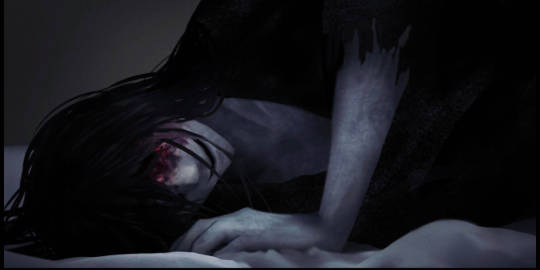
Mr. Crawling
If I had to rank who had the most "romantic" route overall, it would be Mr. Crawling. With the definition usage of love from the Oxford dictionary, verb and noun he checks all the list. Not only that, but we spend time with him the most out of all the other casts. He was the very first ghost we meet (briefly in the beginning) and got stuck with. We are like a baby bird imprinting on him because we saw him first and spent time with him the most, so of course we might feel the most attached to him compared to the others. As the game progresses Mr. Crawling doesn't fail to let us know that he cares for us and our safety warning us of the dangers that come and explaining how to navigate our way around danger. He expresses his worries when we disappeared. He seems to have some concept of love (platonic/ or romantic) as he admittedly tells us that he likes us and ask us if we like him. He expresses how he wants to follow and protect us. He also has so many cute scenes! Scenes where he pats our head, scenes where we lay together, chat a lot together. He is devoted and loyal to us, never harming us even once.

We even get a scene where he gets jealous when we called Mr. Chopped cute with the cat headband! So, he also makes an attempt to be cute too! We are always together with him, and that makes us BOTH happy. Although we don't have our traditional romantic dates like shopping, movie night. We get a bed scene and get to take him back home with us.
There are many types of romance. Platonic and romantic. You the reader/player is allowed to view it however you want. The game does not punish you for the lack of interactions with the casts. You just end up missing out on certain scenes/moments with them is all. However, for the sake of this post I will be making attempts to talk about the romantic aspect (but platonic romance can also be put into place).
·:¨༺ ♱✮♱ ༻¨:··:¨༺ ♱✮♱ ༻¨:··:¨༺ ♱✮♱ ༻¨:·
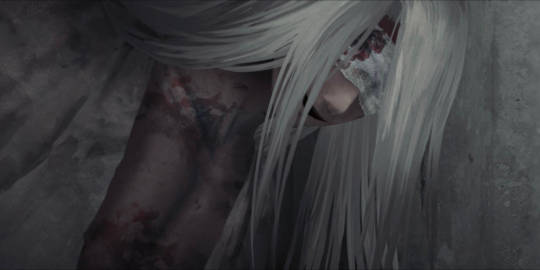
Mr. Silvair
lt's apparent that Mr. Silvair keeps us as research material and confines us in his lair. He is interested in our body, and also interested in returning our mind/intellect back to its original state. It is this interest in us that makes him "love" us. Does confinement and research count as love? Well...maybe not in terms of human definition but in the Mr. Silvair way, it's the closest thing you can get to romantic (or platonic). Afterall, the concept of love has become lost in this world.

I believe he still has some attachment to us, because in the ending A Head's Life, he still keeps you as a companion along with Mr. Chopped. He claims that you are no longer useful/capable but that it is okay, as long as danger is no longer here. When you choose to ask him why he did what he did and ask if he likes you, he tells you it was for research and that love is something he cannot understand. He also doesn't understand why you get so angry when he helped you return your intellect back. He still though has some sort of concept of empathy, because in his route when you choose to kill him and hide yourself away. He comes follow you and expresses that he's sorry and tells you a little about himself. He allows you free will, at this point, allowing you to leave him or stay with him.
·:¨༺ ♱✮♱ ༻¨:··:¨༺ ♱✮♱ ༻¨:··:¨༺ ♱✮♱ ༻¨:·
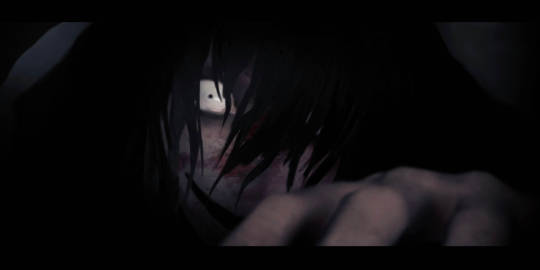
Mr. Gap
Mr. Gap always wants a piece of us, literally. Why does he? Because it's just for fun. The most interaction we get with him is through the multiple crevices within this world and the short route he gets in chapter 4. He takes but sometimes may give. However, he doesn't fail to be thoughtful. It's hilarious how in chapter 4 when he offers us a crowbar in exchange for your heart, you can just smack him for it with no consequences. He also likes to brag about himself to you which honestly is a little cute. With his ending Return, we only have him left in the 'other world'. Our comfort lies with him, although he may be a little annoying, he is the only one we have left. We maybe have become a little codependent on him, but maybe he likes that?

God his annoyed/disgusted face is so hilarious, do it again Mr. Gap! He seems to stick around with us mainly just for funsies and being nosy, and honestly, he is so real for that. But it seems he likes to stay around with us at least. In the return end he is with us, and continues to stay lurking, perhaps watching over us until he is needed. Quite handy am I right? Haha.
He is depicted as quite the gentleman, but also just as fun and teasing. There are times where he does help you with no charge, such as barging into his hole (the face he makes in that scene is hilarious). Again, when presented with beating him for your crowbar, he gets a little upset but, honestly still helps you out. He probably thinks violence is funny which is why he constantly still teases you by asking to take away your body parts. It's just too fun!
Someone had brought up to my attention that Mr.Gap tends to ask for parts that can be easy to part with as we progress. Asking for our feet, legs, and fingers instead, when he seems to still clearly prefer the heart over the other parts. He adjusts his request when he realizes we won’t give our heart.
·:¨༺ ♱✮♱ ༻¨:··:¨༺ ♱✮♱ ༻¨:··:¨༺ ♱✮♱ ༻¨:·
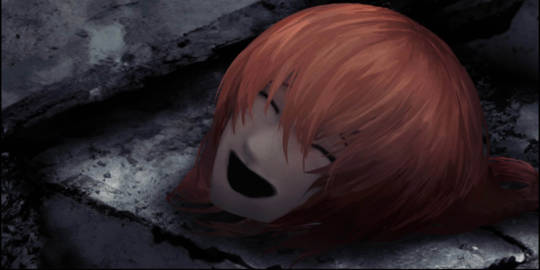
Mr. Chopped
Mr. Chopped is just a head; how can he possibly be or have anything romantic? Well, not necessarily to the level of Mr. Crawling but, we get to have a few small moments with him and spend some time with him. Since he is just a head, he can't help but need to rely on others. Of course, he has to be selectively about it because falling in the wrong hands devastates him.

Mr. Chopped when he gets forced into playing with the deer child, he seems happy to see a familiar face and calls us out to help him. Our poor baby was in trouble!

His ending head hunt is tragically sad but also bittersweet. MC cares so much about Mr. Chopped that she spends an eternity as an entity searching for a lost head, searching for Mr. Chopped who she failed to rescue.
During his own special route Mr. Chopped does his best to help us, but there is only so much a head can do. To make up for his lack of body though, he seems to be more expressive with his mouth and emotions. We get to take him to get a haircut and wash his hair. This seems pretty date like to me. Although our time was abrupt and short with Mr. Chopped. It makes me happy that we get this small, cute scene with him, which makes him much more lovable.
·:¨༺ ♱✮♱ ༻¨:··:¨༺ ♱✮♱ ༻¨:··:¨༺ ♱✮♱ ༻¨:·
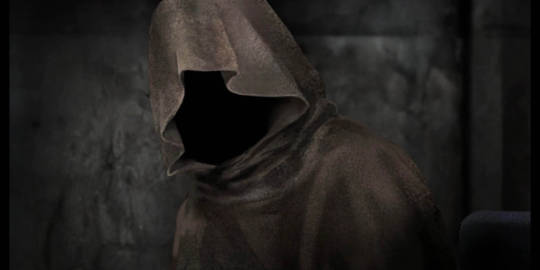
Mr. Hood
Mr. Hood protects you from harm, and also heeds your commands. He also carries you around. He means no harm and is there to guide. He cares for your safety and seems to dislike anything dangerous or threatening towards him and others that he protects.

At the end of his route, he states how often you get in danger and takes you with him, telling you that he must protect you since you asked him to (referring to an earlier scenario when you asked him to stay with you, when you reunited with Mr. Crawling and the others, but he leaves). So I would assume he would always be by your side now eternally staying together and protecting you from danger when needed. How cute! Some people are into that. But personally, for me Mr. Hood felt more like a father/brother to me. Maybe it was because he was always willing to guide us? But some people are into the brotherly/fatherly type of men, and hey I don't judge.
·:¨༺ ♱✮♱ ༻¨:··:¨༺ ♱✮♱ ༻¨:··:¨༺ ♱✮♱ ༻¨:·
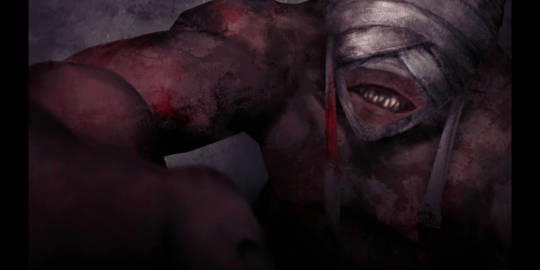
Mr. Machete
At first, I did not see the appeal to Mr. Machete, he seemed like a ghost that killed for boredom and most of the time we just followed him around aimlessly...WELL, after playing his route and letting it soak in my brain. That is entirely the whole point of his character. He is a ghost that had become bored because he had too much time on his hands and continues to search for his home. He is our tsundere dummy macho ghost, and honestly, I love that about him. He could've killed us again like how he tried earlier, but after that first attempt, he reluctantly allows us to follow him. It's funny how much he runs away if the odds are against him, and when he mocks us it's even more hilarious. Mr. Machete likes us if we are strong opponent for him, he even expresses that he thinks we are fun and likes us when we defeat Mr. Hugeface on our own.

Not going to lie, I fell for Mr. Machete right here. We were low on blood, and he just slices his hand, FEEDING us HIS BLOOD. Like OMG that was so hot, he opens our mouth forceful, and we drink his blood. He somewhat cares about us, to be doing all of that for us. After that we get a timed choice to stall or follow him. When you choose to stall he pauses with you and asks if you're okay and to catch up with him. For someone who had been reluctant and annoyed at us for following him, took a moment of his time to wait for you. He WANTED you to tag along with him. We then venture on with him aimlessly searching for his and our home. Torturing each other with our presences. But maybe, just maybe, they can slowly become that home together that they were searching for.
·:¨༺ ♱✮♱ ༻¨:··:¨༺ ♱✮♱ ༻¨:··:¨༺ ♱✮♱ ༻¨:·
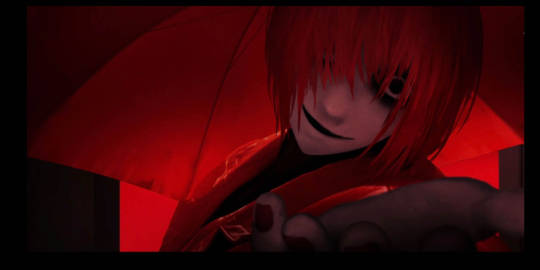
Mr. Scarletella
I LOVE HIM SO MUCH. At first, he appears to be just any ghost that wants to attack us. It took me a while to warm up to him because of so little we knew about him. I thought he wanted to take our name for fun/or collection, but then it's revealed that he knows us. That he harbors some sort of love and obsession for us and believes that we love him because of all the blood and bodies we "offered" him. In a twisted way, this situation is a cute and romantic misunderstanding. Mr. Scarletella fell in love with us for providing him many blood and bodies. He wants us to spend an eternity with him. He WANTS to spend an eternity with us. He invites us to this other world because perhaps he wants us to become a ghostly being just like him, or maybe he wants to have easier access to us (since his myth that he only appears on rainy days) to meet us. Although we didn't get to have as many interactions with him, that is what makes this love toxic. It is a parasocial love, he fell in love with us from afar. When you piece everything together with your dictionary the words he proposes to you sound like wedding vows when you give your name to him. Which make it all so more lovely, even if he takes our soul away.

(My translation/interpretation of the scene, where he asks for your name)
Chapter 2, Scene 24
Scarletella: "You found your name...?"
Scarletella: "Teach me your name." (ARF ARF WRARF)
Scarletella: "I want you." (YES PLEASE)
Scarletella: "Will you give your name?" (OF COURSE)
Scarletella: "Your name?" (👁️👄👁️)
*You give him your name here*

Scarletella: "I have your name."
Scarletella: "I have obtained you." (YES YOU DID, COME TAKE ME)
Scarletella: "Let's leave together." (ARF ARF WRARFFFFFFFF)
Scarletella: "I love you"
Scarletella: "And you love me."
Scarletella: "You gave it to me...Thank you" (I'LL GIVE YOU IT ALL)
Scarletella: "Forever/eternally together..." (YES SIR)
Scarletella: "Together." (ARF ARF WRARRF ARFA)
He is quite the romancer hehe. It seems like Mr. Scarletella has some form of concept when it comes to love, which is to be together forever, even if you end up as a blood pool. Together is together.
I find it interesting how his two endings: Scarletella and Scarlet Rain parallels each other so well. In the Scarletella ending, we (mc unknowingly) give our consent to being together forever with Mr. Scarletella, but we are still alive. When MC wakes up, she sees a clear umbrella on the floor and picks it up. I believe that we have now embodied or spirited the umbrella, spending eternity with Mr. Scarletella. He owns us now.

However, in the Scarlet Rain end he becomes ours, the umbrella stays red, and we still, eternally are together forever.
#文字化化#homicipher#mojibake#mozibake#mr crawling#mr chopped#mr silvair#mr gap#mr machete#mr scarletella#mr hood#homicipher analysis#homicipher thoughts#homicipher opinion#homicipher game
4K notes
·
View notes
Text
Jean Valjean's Canon Toxic Unhealthiness around Romantic Love
( alternate titles: “Does Jean Valjean is Gay?”, or “Does Jean Valjean is Asexual?” Or: “Why is it so difficult to slap an identity/sexuality label onto Jean Valjean?” Or “LGBTPTSD+”)
I was looking at the responses to this poll about whether people interpret Jean Valjean as gay/asexual/straight or something else….and it got me thinking again about Jean Valjean’s canonical intense, complex, awful, toxic, and overwrought emotions around identity/ romantic love. I want to talk about that for a bit because I think it often gets overlooked in fandom!
I've noticed that Les Mis fandom/analysis often tends to interpret Jean Valjean as being far more content, more "at peace with himself," and more "comfortable in his own skin" than he ever is within the novel. This is also a common change in adaptations. The musical's version of Jean Valjean is great-- but he also seems a lot more self-actualized, more like he's gotten himself completely "figured out" by the end of the story. Other, bad, Les Mis adaptations — the adaptations that generally portray Jean Valjean a worse more violent person — also usually make Jean Valjean more confident in himself, more confident in his own feelings/desires, more certain that he’s entitled to certain things, and more willing to demand or take what he wants.
But one major aspect of book Jean Valjean's personality is that he does not have a healthy relationship with anything about himself. He has a tortured broken relationship with his own identity. He repeatedly thinks about “Jean Valjean” as a person outside of himself, a person who he finds frightening, repulsive, savage, and horrible— like a wild animal he needs to sedate, or beat into submission. He is obsessed with self-denial and self-repression. He is fixated on the idea that he is subhuman, that he is not allowed to want things or to pursue having any kinds of relationships with other people-- and that the most heroic thing he can do is "grab himself by the collar” and violently force himself to stay away from the things he wants. He is desperate to be loved and fixated on being unworthy of love and on denying himself love. He is absolutely not at peace with his identity: to paraphrase Jean Valjean in one of the later chapters, he believes he can only gain inner peace by “eviscerating his own entrails.”
He is never truly content with who he is, what he wants, or what kind of love he wants— and he never learns to be. The novel ends with him cutting himself off from his only family, breaking ties with the only person who loves him, and essentially slowly killing himself out of self-loathing.
There are other characters in Les Mis who seem very content with who they are and what they want. Enjolras is self-assured in his identity, and doesn’t appear to feel like there is any kind of love that is missing from his life. Whether you interpret him as gay or ace or trans or w/e, book!Enjolras is written as someone who is extremely self-assured and has a loving support system that is enough to keep him happy. But I don’t think that’s true for Jean Valjean at all XD.
And that’s why it's hard to apply labels like “aromantic” or “ace” or gay/straight/etc to Jean Valjean, when talking about his canon characterization. Those labels imply the person has a basic level of comfort with acknowledging their own desires/lack of desire/identity. And Jean Valjean never achieves that level of comfort. What “label” do you give to someone whose relationship with their identity is “I do not belong in a family, I have no right to want things, I have no right to be happy, I am outside of life, and I will never be at peace until I eviscerate my own entrails?” Is there a “self-disembowelment" pride flag? XD I've seen a lot of interpretations that go "Jean Valjean never expresses any interest in romance, he's perfectly content just to have his relationship with his daughter" but I honestly don't think that's true. Jean Valjean tries to content himself with having only Cosette. But part of why everything explodes so catastrophically in the end of the novel is because he needs more than just a paternal relationship. He doesn’t try to have a “normal” father-daughter relationship with Cosette, he tries to force his relationship with Cosette to be literally everything and everyone to him, for her to be his entire world: and it doesn’t work.
There’s a passage in the novel that talks about how all the love Valjean is capable of ends up being suppressed/sublimated into his relationship with Cosette. The love of a brother, of a friend, of a father, of a husband, the love of everything he is capable of, gets repressed so that he can throw every part of himself into being a father. There are Bad les mis adaptations that incorrectly misinterpret that passage to mean that Jean Valjean is incestuous/grooming Cosette. But in context, that’s not what the passage means at all.
The passage specifies very explicitly that Jean Valjean “did not love Cosette otherwise than as a father,” that “no marriage was possible between them,” that his feelings for her are absolutely paternal. But the passage does show how Jean Valjean is doing a very different unhealthy thing: he’s relying on Cosette to fill every single emotional void in his life.
He’s relying on parenthood to fill the grief/emptiness left behind by all the other kinds of love that he has wanted, but never been given.
To quote a bit of that passage:
Jean Valjean did not love Cosette otherwise than as a father (…) Let the reader recall the situation of heart which we have already indicated. No marriage was possible between them; not even that of souls; and yet, it is certain that their destinies were wedded. With the exception of Cosette, that is to say, with the exception of a childhood, Jean Valjean had never, in the whole of his long life, known anything of that which may be loved. The passions and loves which succeed each other had not produced in him those successive green growths, tender green or dark green, which can be seen in foliage which passes through the winter and in men who pass fifty. In short, and we have insisted on it more than once, all this interior fusion, all this whole, of which the sum total was a lofty virtue, ended in rendering Jean Valjean a father to Cosette. A strange father, forged from the grandfather, the son, the brother, and the husband, that existed in Jean Valjean; a father in whom there was included even a mother; a father who loved Cosette and adored her, and who held that child as his light, his home, his family, his country, his paradise.
Jean Valjean reminds me of a Failmode I’ve seen in a lot of different real-life parents? There are parents who cope with their own hard lives by telling themselves that parenthood is their sole reason for being alive, and who obsess over their child’s success as their only source of purpose, meaning, love, happiness, community, and validation. But it’s a bad idea to rely on one child to provide the emotional support that should be shared by friends, parents, siblings, every possible loved one, etc etc—- One child can’t actually heal you from your trauma, be a replacement for your broken relationships, pull you out of your grief, save you from your adult loneliness, etc etc etc etc.
When I see the common interpretation that Jean Valjean is perfectly content just to be the father of Cosette, I think of this line:
Thus when he saw that the end had absolutely come, that she was escaping from him, that she was slipping from his hands, that she was gliding from him, like a cloud, like water, when he had before his eyes this crushing proof: “another is the goal of her heart, another is the wish of her life; there is a dearest one, I am no longer anything but her father, I no longer exist”; when he could no longer doubt, when he said to himself: “She is going away from me!” the grief which he felt surpassed the bounds of possibility. To have done all that he had done for the purpose of ending like this! And the very idea of being nothing!
On one hand, the terrible Les mis adaptations that portray Valjean as Incest Creep are incorrect and wrong. On the other hand, though, Jean Valjean IS unhealthy about Cosette— just in a different and actually sympathetic way.
He has made fatherhood his only purpose, to replace every other purpose he could have in life. So he can’t be “just Cosette’s father.” He can’t imagine her becoming an adult and leaving the nest, like children do. What does he have if he’s not taking care of her? What is his purpose in life if she doesn’t need him to be her parent? He's not just being her father, he's relying on her to be his entire reason to exist. He hasn't been allowing himself to have things outside of her.
And speaking of things outside of Cosette: segue time. This post was supposed to be about Jean Valjean and romance, so let's switch gears and talk about his canon 'romantic experiences' more:
We’re told that in his youth he “never had a sweetheart” because he “never had time to be in love.” There is no indication that Jean Valjean never wanted to be in love. The opposite is implied. Hugo frames it as a tragedy that Jean Valjean’s does not experience young love; it’s the horror of poverty taking yet another thing from him.
Within prison, Valjean is “gloomy” and “chaste;” when he traumadumps to Montparnasse about it, he talks about women looking on galley slaves with horror and disgust. Romance, at least “normal” heterosexual romance, is no longer something that is permitted for him. Jean Valjean knows very little about romance/love/sex and it repeatedly messes up his life. He spends 19 years in the all-male environment of prison, then about a decade in the almost-all-female environment of the convent. He has very little experience with how men and women are supposed to interact. The oppression Fantine faces as a sex worker, and Cosette's relationship with Marius, are both two big 'blind spots' that he struggles with.
At one point romantic love is described as “The only misery Jean Valjean had not yet experienced, and the only one that is sweet.”
In his massive confession to Marius, he agonizes over how he is not allowed to be part of a family, and is incapable of being part of a home. He compares himself to someone sick and diseased, that poisons good and normal people with his presence, and cannot be allowed to make himself part of their families.
So Jean Valjean doesn’t frame Romance as “a thing he doesn’t want:” it’s a thing “he is not allowed to want,” it is one of the many things he is banned from wanting. It's impossible to tell what kind of things he would want, if he were allowed to want them.
One of the most interesting things to me, however, is his general attitude towards Marius/Cosette.
Obviously his first reaction to Marius snooping around is fear and resentment— he doesn’t know to interact with romance, having never experienced it, and immediately begins catastrophizing. He views Marius as a privileged booby ruining his life for something as frivolous as a love affair: it reads to me as partially envy, envy of the fact that Marius lives the kind of safe comfortable life that allows him to experience young love.
Jean Valjean added: “What does he want? A love affair! A love affair! And I? What! I have been first, the most wretched of men, and then the most unhappy, and I have traversed sixty years of life on my knees, I have suffered everything that man can suffer, I have grown old without having been young, I have lived without a family, without relatives, without friends, without life, without children, I have left my blood on every stone, on every bramble, on every mile-post, along every wall, I have been gentle, though others have been hard to me, and kind, although others have been malicious, I have become an honest man once more, in spite of everything, I have repented of the evil that I have done and have forgiven the evil that has been done to me, and at the moment when I receive my recompense, at the moment when it is all over, at the moment when I am just touching the goal, at the moment when I have what I desire, it is well, it is good, I have paid, I have earned it, all this is to take flight, all this will vanish, and I shall lose Cosette, and I shall lose my life, my joy, my soul, because it has pleased a great booby to come and lounge at the Luxembourg.”
But, even though Jean Valjean views romance as something he isn’t allowed or have or to want, views it as a threat and catastrophizes over how it will ruin his life……he seems to also put heterosexual romance on a pedestal.
The way Jean Valjean idealizes marriage is one of his weirdest character notes for me.
He views marriage as Cosette’s “happy ending.” It’s her “happily ever after” point where she won’t need him anymore, where she won’t need anyone outside of her husband. A Man And a Woman Are Meant to Get Married, It's Fate, and It Means They Will Live Happily Together Forever. Marius is “the goal of her heart, the wish of her life; her dearest one.” Nothing outside of that matters anymore.
He treats her marriage as if romantic love is inherently always more important than any kind of platonic relationships, and always takes priority over them. He later dismisses the unconventional family structure he has with Cosette, saying that despite his love for her he was only a "passerby" and was not actually her real father, because they were not biologically related.
There's a moment where Jean Valjean is described as someone whose ideal is to be angel on the inside and a bourgeois on the outside. Jean Valjean's worship of bourgeois social norms, norms he can never truly be a part of, is one of his character flaws. He has a similar "guard dog" energy as Eponine does when she defends Rue Plumet from her parents.....Eponine and Jean Valjean both become the guard dogs of a kind of romantic relationship they believe they are banned from having. Jean Valjean believes that getting Happily Straight Married in a Middle-Class Home with a Picket Fence(tm) is the ideal path for life....but believes himself broken/incapable of ever following that path. And so he instead throws his entire life into securing that future for Marius and Cosette.
In what manner was Jean Valjean to behave in relation to the happiness of Cosette and Marius? It was he who had willed that happiness, it was he who had brought it about; he had, himself, buried it in his entrails, and at that moment, when he reflected on it, he was able to enjoy the sort of satisfaction which an armorer would experience on recognizing his factory mark on a knife, on withdrawing it, all smoking, from his own breast. Cosette had Marius, Marius possessed Cosette. They had everything, even riches. And this was his doing.
TL: DR:
Jean Valjean's gender/sexuality label is “idk but he’s super fucked up about it.”
#les mis#jean valjean#les mis letters#because i BRIEFLY tied it into Eponine#my idea for a self disembowelment pride flag#is that its like. prometheus and the eagle#but prometheus is into it#not sure how coherent this essay is but I am POasting it
283 notes
·
View notes
Text
Japanese Linguistic Observations in Spy x Family - part 1
This is a post series I've been planning for a while and I've finally had the time to complete part 1! 😃 I may have mentioned here before that I got my B.A. in Japanese/East Asian Studies, and even though I'm not fluent, I know the linguistics of the language fairly well. So I thought it would be fun to examine the interesting aspects of the Japanese version of the SxF manga that aren't reflected in the English translation. It might also be an informative experience for those who don't know any Japanese to learn a bit about the language through SxF! I'll try not to get too technical with the linguistics and keep my explanations at a beginner's level.
-----
Part 1 - Twilight's "honne and tatemae"
One of the main themes in SxF is how many of the characters have secrets they want to hide, so they act a certain way in front of others in order to mask their true selves. Japanese has a word for this phenomena called 本音と建前 ("honne and tatemae").
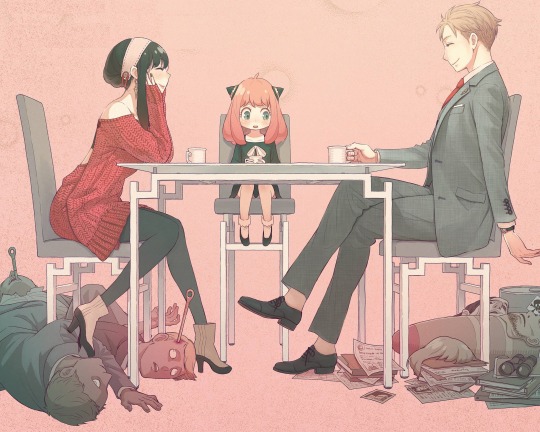
I remember learning about the concept of "honne and tatemae" during my Japanese college studies – a quick google search will yield a lot of publications on the topic and its relation to Japanese culture in particular. While the idea of hiding one's true intentions behind a fake facade can exist anywhere and is not something unique to Japan, it is enough of an occurrence in Japanese culture that there are specific words for it. The Wiki article has a basic but good definition of honne and tatemae, to quote:
A person's honne may be contrary to what is expected by society or what is required according to one's position and circumstances, and they are often kept hidden, except with one's closest friends. Tatemae is what is expected by society and required according to one's position and circumstances, and these may or may not match one's honne. In many cases, tatemae leads to outright telling of lies in order to avoid exposing the true inward feelings.
Sounds very much like the characters in SxF, doesn't it? Twilight especially, because unlike other characters like Yor and Anya, who simply have secrets they need to keep but don't create fake personas for themselves, Twilight does – the cheerful, friendly Loid Forger is a different person from the cold, calculating Twilight after all. Also unlike Yor and Anya, who speak the same way consistently no matter who they're talking to, Twilight uses different speech levels depending on which persona he's using and who he's talking to.
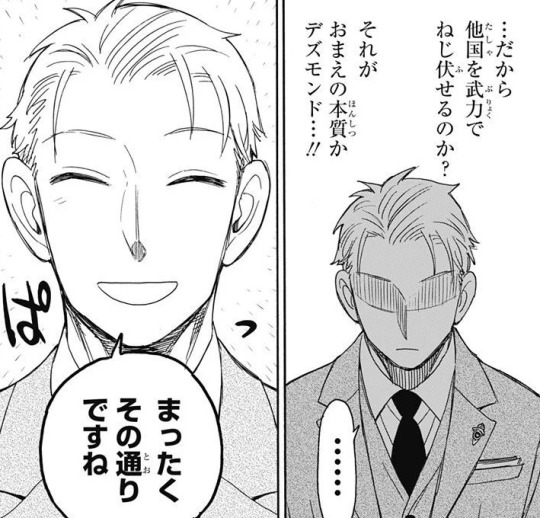
There are many different levels of speech in Japanese, ranging from super formal to totally crude. These speech levels are distinguished mostly by the pronouns the speaker chooses to use for themselves and who they're speaking to, as well as how they choose to conjugate the words they use. For example, 座ってください (suwatte kudasai), 座って (suwatte,) and 座れ (suware) all mean "sit," as in, telling someone to sit down. But the tone being conveyed is different: the first one is polite, the second one is casual, and the last one could be seen as rude if you're not using it with a close friend/family member.
As Twilight, he uses casual speech with the masculine and less polite pronoun 俺 or オレ (ore). This is the speech he uses when talking to a fellow spy like Fiona, and for his own inner thoughts.
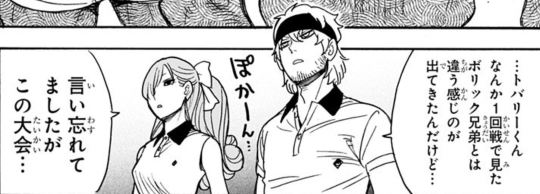
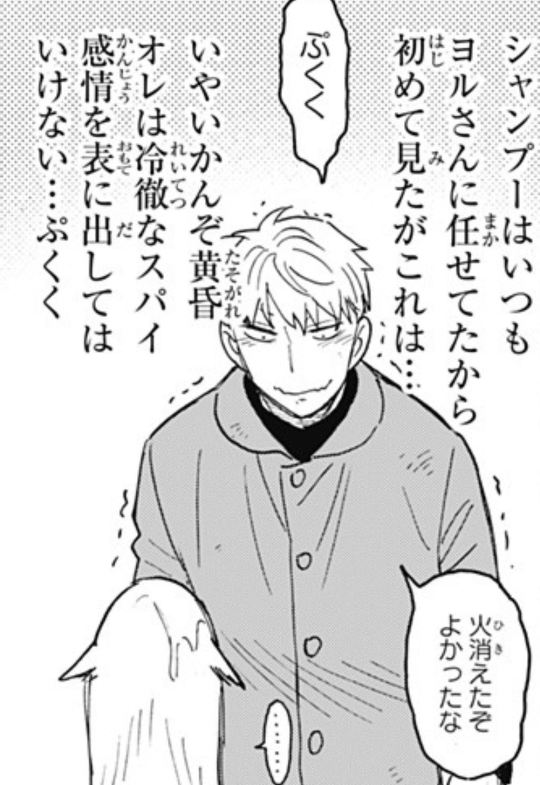
As Loid Forger, he uses the polite 敬語 (keigo) speech, which is basically comprised of using the -ます (-masu) conjugation for verbs and the "to be" verb です (desu). He also uses the pronoun ボク or 僕 (boku), which is the standard male pronoun and more polite than "ore." He uses keigo to address pretty much everyone who doesn't know his true identity. When talking to a higher-up like Sylvia, he'll still use "ore" but will use polite speech instead of casual speech.
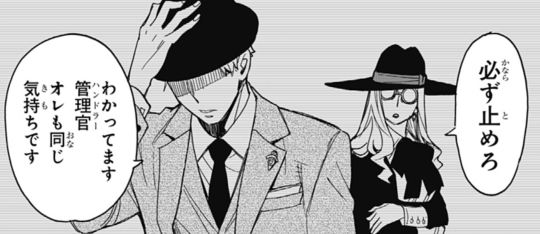
Anya is an exception to this: with her, he uses his most casual speech, the same as he uses with Franky.
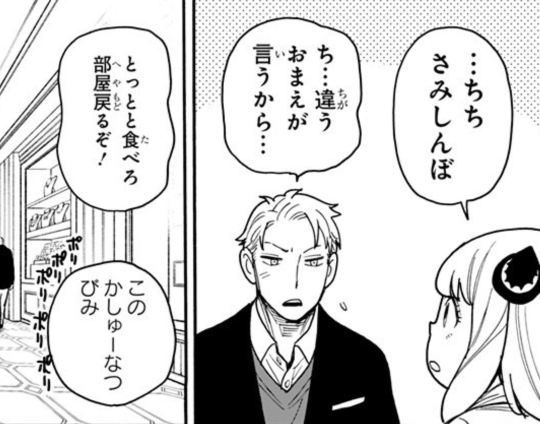
I discussed a bit about this in part 24 of my Twiyor analysis posts, but this could be because Anya is a little kid, so he doesn't feel the need to put on any airs with her (same with Bond, whom he also uses casual speech with).
An interesting side note is that, as a child, Twilight used the pronoun "boku" but then changed to "ore" as soon as he became an adult/soldier.
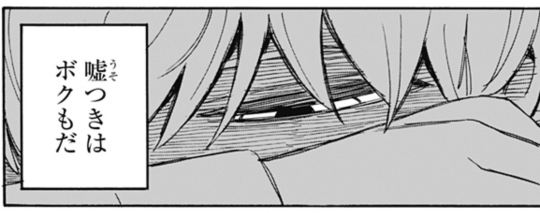
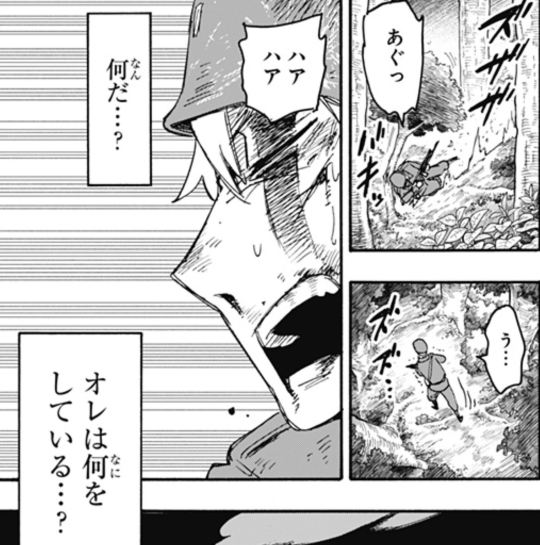
Another aspect of keigo, besides using the more polite forms of pronouns and verb conjugations, is putting the honorific さん (san) after people's names. Twilight does this all the time with Yor, as she does with him. However, he switches to casual speech and drops the "san" part in her name when addressing her in front of people who (supposedly) believe they're a real married couple, such as Yuri and Fiona – because it would be weird for a real couple who have been married for a year to address each other in such a formal way, especially the husband. In the below panel when Fiona visits them, he's calling her "Yor" instead of "Yor-san" and using casual speech instead of keigo.
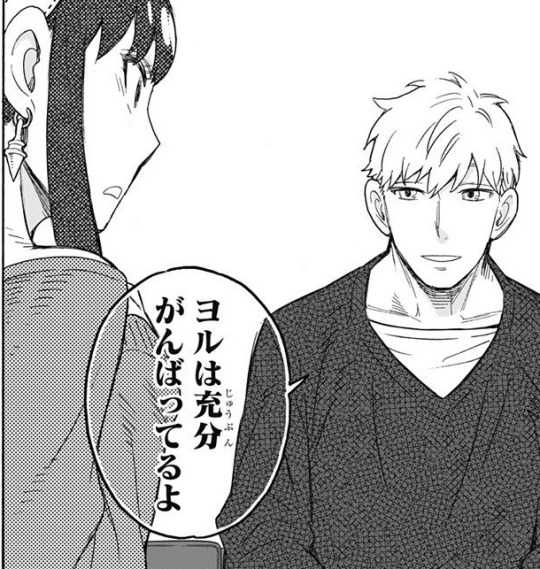
Oddly in these situations, while he uses just "Yor" when addressing her directly, he still calls her "Yor-san" when talking about her. During Yuri's first visit for example, he calls her "Yor-san" when telling Yuri how much Anya loves her (talking to someone about her) but then calls her just "Yor" a few moments later when telling her that he'll clean up the spill (talking to her directly). It's strange to me that he wouldn't just consistently use "Yor" whether he's talking to her or about her in these situations...I'm honestly not sure if he does this intentionally or if he just slips up since he's so used to using "Yor-san" in her presence.
*UPDATE* Thank you to @dentedintheworld-blog for enlightening me with the below reply about this!
"In Japanese, when speaking to your spouse's family about your spouse, you address her/him by attaching "san" her/his name out of respect for her/his family. This is also to show her/his family that you respect your spouse. That's why Loid calls Yor with san when he talks about how much he loves Yor to Yuri."
That definitely makes sense for why Twilight switches between "Yor" and "Yor-san" in these situations.
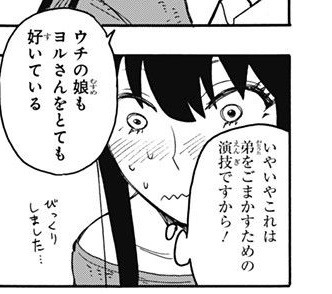
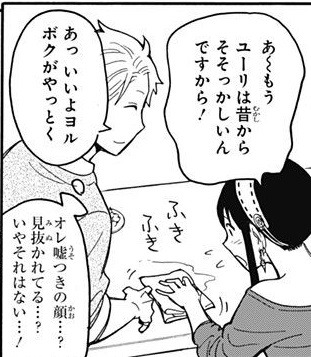
Regardless, this is why the scene in chapter 86 is so significant – when Yor isn't present, there's no reason for him to refer to her as "Yor-san," especially in front of a fellow spy like Fiona who knows he (supposedly) shouldn't have any feelings for her. Yet, even after he just called Yuri by his full name "Yuri Briar" a moment before, he doesn't do the same for Yor and continues to call her "Yor-san" here, much to Fiona's dismay.
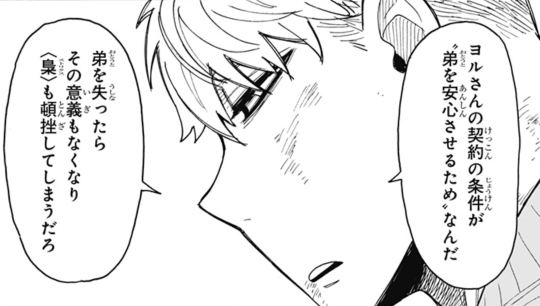
In the same chapter, it's also significant that he uses "ore" when addressing Yor directly in his thoughts. Even though he's not speaking out loud, I believe this is the first time he's speaking directly "to" her as Twilight and/or his true self and not as Loid Forger.
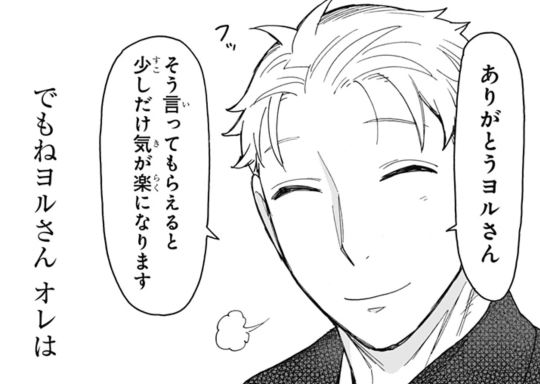
But despite all this, I think that both Loid Forger and Twilight are tatemae…they're both masks to hide the person he truly is. The person who fondly talked about his mother to Yor on the park bench, the person who genuinely expressed gratitude for her sacrifice when leaving the resort island, the person who refused to kill Yuri in a life-or-death struggle because he knew it would hurt her…that's his actual honne. But of course, the ongoing conflict of the series is that he has yet to realize this. He won't even show his honne to his closest friend, Franky. Seems like it mostly comes out in dribs and drabs during his interactions with Yor...no surprise there, lol. The man is certainly a work in progress. When he finally starts letting his "honne" show, I'm curious what form of speech he'll adopt.
-----
Continue to Part 2 ->
#spy x family#sxf#spy family#spyxfamily#loid forger#twiyor#sxf spoilers#sxf manga#sxf manga spoilers#sxf analysis
684 notes
·
View notes
Text
So... I wanted to write about the Caitlyn hate train because it's flooding my twt.
First I'd like to start by saying that you're entitled to dislike a character. Arcane is a work of art, but it's also just cartoons -whatever, just hate the cartoon character. I don't even like Caitlyn that much, mostly I find her arc very compelling.
But. The amount of hate and the shape it takes, for me, is very clearly influenced by a few factors.
With Caitlyn I feel like half of the folks are just regurgitating discourse they read before and try to earn internet morality/politics points while very much forgetting to touch grass. There is no"I don't like her", there is a sense of rightgeousness in disliking her that doesn't make much sense. "She's literally Hitler!" Please think. There are real life fascists and nazis over here. This is a cartoon who's the bad guy for like four and a half episodes.
There are interesting conversations to have about how Caitlyn's actions mirror real life oppression, as many also point out as a reason to hate her. It's fair that you dislike her those actions, to be honest. But 1) stories are not made to be morally perfect but to explore themes and emotions -characters will do bad, even evil things; 2) critical consumption of media exists; 3) using political language to hate on a fictional character with no real political critique/analysis behind makes me think you don't really believe that much what you're saying & you just want to use buzzwords you learned on the internet.
Takes like this are tinted with some sort of attempt to a moral high ground for disliking a fictional character for political reasons, while simultaneously refusing to understand the narrative of the character and think critically about what it is trying to say about real world politics.
To analyse a story you have to engage with it. See what it wants to tell you. See how it does it. See how it fails. You can dislike Caitlyn and tbh disliking her because of her role in the story is more than fair. But that doesn't equal media analysis. And I'm sorry but not liking a character doesn't make you more politically committed than the rest.
There are so many interesting things to say about Arcane's flawed portrayal of politics. How it uses the aesthetics of oppression to tell a story without deeply analysing the oppression itself within the narrative, how the context in which it was created and the beliefs held by its authors afect the portrayal of themes... Among all these, "Caitlyn is evil and irredeemable because we saw a montage of her and Vi doing police violence" is a very superficial take. Please, please, pleeease analyse those montages frame by frame and discuss how they showcase police violence, what bias they have, what purpose it serves. Analyse how it takes from real life events in a way that is insensitive. I'd love it sooo much to see posts like this.
On the other side, I've seen people say both that say Caitlyn is evil because of the acts she commits and then say that Silco is a revolutionaire. What? Silco WAS a revolutionaire, and he still had a motivation to make Zaun free, but his motivations do not match his actions and that's pretty obvious. "Sometimes revolution requires violent resistance" = "Silco is a revolution hero" showcases a very shallow level understanding of the first phrase there. Silco flooded the streets of Zaun with drugs. The Firelights were born out of willingness to defend zaunites from Silco and Jinx. Silco did not do violent resistance against Piltover, not since the rebellion he had led with Vander. He tried to invent shimmer as a weapon to fight again and the only thing he managed is to make many people misserable and dependent on it -and he didn't care. His character and his actions are quite more complicated than "he's doing everything for revolution"; but again, another character reduced to a catchphrase that fails to actually engage with his story. Only difference between these people's opinions on Silco and Caitlyn is that Silco's character has the word "revolution" near in the script and Caitlyn's script includes "cop".
Another thing is, why hate Caitlyn so much and not say a single thing about Ambessa? I can think of a few reasons but I'll summarise like this:
1) Not being aware that Ambessa is always the one calling the shots here even if Caitlyn is given the title of Commander. Even though the show is very much making this clear.
2) Because Caitlyn gets a redemption and Ambessa gets "punished" aka is a villain and dies. As if humans where not more complex than good and evil.
3) Caitlyn's more popular than Ambessa I guess? It's always more fun to hate on the popular character. Also she's a main character so she'd obviously get more more attention.
3) Some people just want women to be perfectly moral all the time, and in wlw relationships even more. I didn't want to bring up fandom misoginy & lesbophobia but I can tell if it was Jayce having her narrative and redemption the discourse would be quite different.
Anyway. Acab and long live critical thinking. I guess I just want to say please send some nuanced Caitlyn takes my way because I'd really love to read those.
#vi arcane#caitlyn arcane#arcane season 2#jinx arcane#caitlyn kiramman#caitvi#arcane season 2 spoilers#arcane spoilers#arcane#arcane league of legends#vi x caitlyn#league of legends caitlyn#arcane discourse#arcane analysis#arcane silco#arcane jayce#arcane ambessa#commander caitlyn#media literacy#media analysis#just hate her for the right reasons idk
155 notes
·
View notes
Text
Something I think about a lot and wonder if maybe gets overlooked in Twilight’s story and as vitally indicative of his character is actually in the very first chapter:
Anya isn’t needed for Strix. Twilight decides to adopt her anyway.


[Spoiler warning: Mostly this post deals with early chapters already in the anime but there is reference to chapter 62, which has not yet been animated and will be in season 3]
Twilight decides it — “I’m going to rework the mission so it doesn’t involve a child because that’s too dangerous” and he’s 100% right! Donovan Desmond is canonically a far right warmonger with fascistic authoritarian aims. His government made liberal use of the SSS — a group to mirror the Stasi — who continue to operate in morally dubious ways (much more likely they’re actively morally reprehensible, though we’ve mostly only had rumours of that so far). From what we can tell, Desmond is at best an absent father and likely actually worse than that: if that's how he treats his own children, imagine how he might treat others. And the timeline seems to indicate that the experimentation performed on Anya was done under Desmond's government — even if Twilight isn't aware of experimentation on children, he is aware of both human and animal experimentation under Desmond's government. Taking all that and also the complexity of Strix's aims, undoubtedly there were other things that could be done, more straightforward if not necessarily easier.
So. Why? Why entertain the change at all? And then, having entertained it, why go back when the reasoning is indisputable?
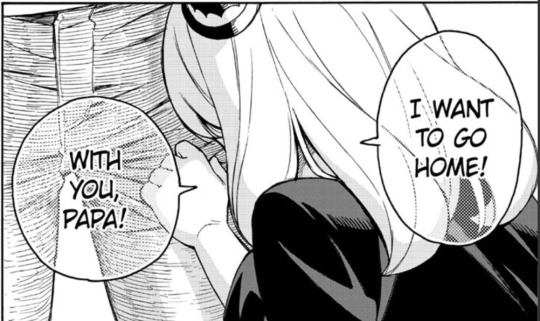
On the Doylist level, I think Endo wanted to ensure that Anya had some agency within the set up — Endo also does this with Yor. It would be much harder to be on Twilight’s side fully, or to trust him on an ethical level/take him as any sort of moral authority, if he were just straightforwardly using these two people. To have them be active and consenting participants (arguably to actually be affirming the arrangement: Twilight sets it up, but Anya and Yor actually make it happen) even if the audience only knows the depth of their knowledge/motivations/etc currently, shifts the power dynamic in important ways.
But it also the set up tells us important things about Twilight. He is largely impatient, cold, detached in chapter one. His overarching feelings towards Anya are, I think, real annoyance, real confusion, and real impatience. He just doesn’t understand this damn kid and it turns out she’s a person which is frankly unacceptable — he’d needed and anticipated an automaton, ideally of himself in miniature form. (Though I think one could ponder whether Twilight was, in many ways, an automaton himself at this point, but that's maybe for another meta 🙃)
He’s not entirely unmoved of course �� we're given to understand he’s affected when Franky tells him how many times Anya’s been adopted and returned, and isn't amused by Franky's joke about names. Franky's comment — "Just don't get attached" — reinforces this. The prospect of “the future” perturbs Twilight when he’s reading the parenting books. His initial reaction to Anya’s kidnap is horror. All these are true too.
Then there’s also this, from earlier in the chapter:

It’s exposition, yeah, and it’s also exposing. "Hopes" and "joys" are very specific words to describe those events. It could simply have been "A marriage? An ordinary life?" but describing them as such — hope for marriage; joy in ordinary life — expose something of what Twilight feels about those two experiences and, on the flipside, they expose what he deems he's lacking. No hopes of intimacy; no joy in (an ordinary) life. There's an argument as well, of course, that he's being ironic but I don't think that actually invalidates the above analysis. Drawing attention to 'hope' and 'joy' at all are revealing, regardless of Twilight's tone in thinking of them. I think it's also interesting this panel, taken in conjunction with a pair of panels in chapter 62, Twilight's backstory. The above is almost a pulled out version of this below panel of Twilight's recollection of his childhood, and of course the returning image of not just a rubbish bin but a rubbish bin on fire when it comes to disposing of his identity:


Back to Strix. Both his final interaction with Karen and the whole everything of the framing of Strix is making Twilight think (and feel, ahem) things that he hasn't for some time. Twilight decides, I’m reworking this. It can’t proceed this way. Not because Anya is a pain in his ass, not because she’s not as (apparently) intellectually advanced as he’d originally thought, not even because he thinks he can find another child who would better be exactly what mission parameters called for. No:

And what changes his mind is Anya asking to come home.

One of the important parts of this to me is this:

He seeks consent.
This moment is a keystone, I think, to understanding Twilight. It’s also more telling than he maybe realises. Twilight is decisive — we all laugh because he spirals at the drop of a hat when his daughter or wife look even mildly upset but outside those (also very telling) scenarios, he makes decisions and he pursues them. Often he makes decisions quickly. He’s a dab hand at it; it’s a large part of why he’s as good a spy as he is.
He’d decided to change Strix.
Anya asks him, in essence, not to.
So, he doesn't.
But it's wild that he entertains keeping her request at all — why? Why even entertain it? It’s dangerous; it’s impractical; there are too many moving parts outside his direct control; Anya isn’t the sort of child he’d wanted for the mission if he’d spent any time thinking about what a child might actually be like; Strix is in many ways an extremely long shot anyway, Desmond could just stop attending for reasons unknown and unrelated; etc.
So, yeah, why? Maybe because of this —

In conjunction, I often think of this moment in the cruise arc:


Twilight first naming the feeling as lonesome, and secondly tacitly conceding that he perceives Yor as a companion and that that relationship is important to him, something to be missed. What makes this for me though is that Anya calls this out "Papa's you're so sappy" and Twilight's reaction is that of someone caught-out. He doesn’t say “nuh-uh!” but he may as well have. Essentially, something landed a bit close to home, hm? Maybe some of that hope for marriage? A soupçon of joy of an ordinary life?
Twilight’s loneliness underpins many of his decisions with his family — probably without him being fully conscious of it. I think he is at least somewhat conscious of it, but also if he looks too closely... Well, best not to. I could fill this post, I think, with images that demonstrate his loneliness throughout the series; that sorrowful/pensive close-up of his eye(s) is one of the abiding motifs for Twilight throughout. I'd probably start with this one from Twilight's backstory arc:

Anya's request plays directly off his loneliness. Still though, he doesn’t immediately capitulate — he emphasises Anya’s choice. Is she sure? The last day has been scary for a child (and for him, but he's ignoring that part) and Twilight, in his increasing recognition that Anya is a person, is probably aware in the back of his mind that he hasn’t exactly been warm or welcoming or at all patient with her. Things that people respond to — he's otherwise excellent at manipulating people, so of course he understands this. So. Given she'd just had this scary experience, given he hasn't exactly been great with her: Is she sure? She wants to come home — with him?
I think the moment may get a little lost because Anya says something riffing off his own earlier thoughts and self-revelation (featuring that shadowed, lonely eye motif again!)

Were this a post about Anya, I’d talk about how it’s an important character moment for her as well by way both of demonstrating her agency/choice and also that she isn’t nearly as dumb as Twilight thinks (and the audience, maybe, also thinks).
But in my view, she didn’t actually need to say anything about it making her cry. I think she could simply have said yes in that moment and Twilight would have agreed.
Twilight’s an unreliable narrator; he’s disconnected from his heart and that shrouds his own motivations from himself — something he actually also concedes in this chapter!


And it shrouds from us just how much he actually understands himself. He’s also a master of deflection. Easy to assume or say that bringing Anya home is just to align with Strix. Nothing more to see here; nothing else going on. But also that ripping off of the mask in the panel above — and the literal 'riiip' sound effects — also indicate to us that this is an unveiling to himself.
In my view, Twilight agreeing to Anya's request, deciding to go back to original mission parameters, actually shifts his motivations, subtly. Now he’s committed not only to the original mission goals, but also to Anya. He needs Anya to succeed at Strix, not only for Strix's sake, but also because otherwise the mission will end and she’ll have to go back to the orphanage, and he’s just agreed with her not to do that (not right away, in any case). I don’t think at this point he’s thinking it’s forever — his thoughts throughout the manga indicate he still expects the Forgers to be temporary. I don't think the shift in motivation is necessarily even conscious, but given the set up, I think something inside Twilight recognises that agreeing to bring Anya home is a compact, jointly engaged. Mostly all this has become subsumed into Strix: he makes decisions. He pursues them. He deflects, even from himself. Of course it's just for the mission; this saved him the trouble of reworking it, of figuring out something else. Nothing more to see; no need to think any more on it. And to be fair to him, Strix is very high stakes, resting pretty solely on his shoulders, so of course that is, objectively, motivation enough. Why even consider beyond that?
But I personally think that to the extent he's aware of it at all, there is something else going on, that he wants to have Anya for as long as it takes him to work something else out for her. If that's the case, then of course, we have Occam’s razor: the simplest solution may be the best one.
Maybe Twilight should just keep Anya himself, eh?

[Image description: gif from Spy x Family season 1, episode 1. Twilight and Anya have just found out Anya passed her entrance exam and are overjoyed. Celebratory, Twilight picks Anya up and swoops her into the air as they smile at one another. End image description]
#spy x family#spy x family meta#agent twilight#loid forger#sxf manga#sxf manga spoilers#i haven't talked too much about yor in this but ofc she is also an important part of this dynamic#i’ve been in my thoughts for weeks about twilight and they’re all pouring out 🥲#i tried to work them out in fic first but it was not enough 😤#should I put some of this post behind a cut? pls lmk if yes#also caveat that ofc i'm working from translations which may sometimes miss nuance/be somewhat off from endo's originals#here fandom take this!#gif#and i had a whole section about the complexity of consent in children and particularly a child with anya's background#ultimately tho this is fiction we're discussing and i'm sticking within those parametres pls and thx
397 notes
·
View notes
Note
i'm so curious about your character gender reads now tho 👀👀
(You enter the kitchen and see me, eating shredded cheese out of the fridge by the handful)

(I turn around to face you.)
Hi. Do you want me to sell you on amab NB Siffrin? I'm going to try and sell you on amab NB Siffrin. And maybe even a little bit of tranfem siffrin and/or loop. as a treat. just for you.
So, (I put the cheese back in the fridge.)
This read of mine comes from a number of things, a lot of them to do with the game's themes, and to do with Siffrin being a narrative foil to the other characters. And Vaugarde as a whole.
(READMORE WARNING: THIS IS LIKE 6K WORDS LONG. YOU ALL SHOULD KNOW BY NOW I DON'T MAKE POSTS WITHOUT UNCONSCIOUNABLE AMOUNTS OF EVIDENCE AND EXPLANATION. IF ANYTHING I'M BEING RESTRAINED HERE. THUMBS UP.)
(Pre-readmore note: this is in response to me having given an analysis of how I personally percieve Sifloop in relation to asexuality and shipping. Which you can look at here. (x))
It is however, not what my like, no-holds-barred no-rules just-for-me headcanon for Siffrin would be. (which is intersex 'head empty no thoughts' siffrin, for the record). This is instead my close-reading-of-the-text-and-themes interpretation of Siffrin. This is why I'm gonna be saying Read and not Headcanon, to distinguish the two. (Anything I consider a little bit too much of a stretch vis a vis interpretive hard reads I will call a headcanon. But those are for the last bit of this post.)
Unlike *gestures at mass media* All That… ISAT is already packed to the gills with queer rep, to the point where I feel no need to grasp at straws and make overextended reaches into obviously unintended subtext. Like with, y'know, most media. Since here, the subtext isn't unintended. Like this isn't a Transfem Metal Sonic or Aroace Ash Ketchum situation where I know none of the evidence is on purpose and I'm just having fun making a conspiracy theory pinboard out of it. This is like… There's intentionality there. And I want to engage with it on its level, see what the text itself suggests. It's my personal preferred method of expressing deep respect to a text. (Not that it has to be anyone else's, obviously. This is just my way of showing I love a work.)
So yeah, I am, in general, very interested in hearing hard-fought arguments when it comes to interpreting texts. I'm glad ISAT has a lot to pick at here, and so, I will. (and since not a lot of texts ever have anywhere near this kind of depth in this arena, i don't wanna squander it… i'll try and keep my own biases as in check as i can, and already have done by hashing quite a bit of this interpretation out with two people of very different gender identities to mine. To put it mildly, binary-aligned or transfem I am very squarely Not.)
(Now that the cheese bag has been removed from the equation, I drop this framing device, sit you down at the table and begin to dredge up evidence from below it.)
Okay, so. What are my like… Core reasonings here? I think I can split it into three categories. Broadly, with an amount of overlap, so bear with me…
SIFFRIN AS A FOIL AND CONTRAST TO MIRABELLE, ISABEAU AND THE CHANGE RELIGION AS A WHOLE.
SIFFRIN'S HABITS OF CLINGING TO 'KNOWN QUANTITIES', SCAPEGOATS, AND THEMES OF RACIAL IDENTITY INTERSECTING WITH GENDER IDENTITY.
SIFFRIN, LOOP, DE-PERSONING, DEHUMANISING, APATHY AND SURVIVAL.
Okay so up top I'm going to split my argument for Siffrin's gender identity Present and Future here. This means, for now, I'm arguing for AMAB NB Siffrin alone. The transfem stuff is for later (and more for loop, in my mind, too).
I have a few direct observations of the text here that set things up. Here are the things in-game that make me assume that Siffrin, as of the start of the game, has not yet undergone any radical change to their identity in their life. Not on purpose, at least. These are ordered in a messy but logical flow, so uh, try and keep up. I'll synthesise at the end. I Prommy.
SIFFRIN AS A FOIL AND CONTRAST TO MIRABELLE, ISABEAU AND THE CHANGE RELIGION AS A WHOLE.
CHANGE & THE UNIVERSE: PERCEIVED OPPOSITES
When interacting with most objects in the Changing Room in the house, they express a genuine curiosity toward body craft. It seems they are legitimately unfamiliar with it on a deeper level than having simply heard of it.
Despite this curiosity (explicitly stating they've previously wondered about it), they dismiss it as too much work early on in the game. These points combined seem to suggest to me that they have never previously sought out any kind of real change to their appearance or identity. Either for gender reasons, or other body dysmorphia reasons. (Which, despite the dismissal, they do refer to their body as a 'meat prison', which is not particularly positive) However...
This changes in Act 3. In acts 3 and 4 they flatly state: "You're thinking about crafting your body. You seem to have all the time in the world now." While still never spoken aloud, their declining mental state corrosponds with a worn-down, almost nihilistic reckoning with the feelings they masked with the 'meat prison' joke in act 2.

[Image: Interactions with the change craft textbook in acts 2 and 3/4.]
In talking to Mirabelle, they are very self assured that one can stay the same/be comfortable with their born identity. They also seem a little unsettled by the change religion's flippancy in general, which makes sense, as they have been clinging to the famliar (even when painful) to cope with other traumas. (More on this later, section 2)
The Universe Faith appears to heavily disincentivise Wanting for oneself and other expressions of Free Will due to safeguarding against Wish craft. This seems to have impacted Siffrin's mental state majorly, even if they do not recognise it. The followers of the faith are (if Siffrin is to be believed) incentivised to 'go with the flow' and take paths of least resistance, and those that DO make big decisions will tend to justify things as being The Universe's Will. (See: The King's entire Modus Operandi, and the way Loop (and Siffrin) do the same rote actions, constructing worldviews (the play analogy, the Universe's Will) and justify that as what the Universe Would Want (despite a total lack of evidence to prove as such)) As such, it seems as if a follower of this faith as neurotic as Siffrin would be unlikely to act upon any Wants to Change Themselves without a lot of turmoil and backwards-justification. (Of note, Loop's forcible change coinciding with a dropping of pronoun. But that is again for later, section 3) As of the start of the game, they do not appear to have broached this kind of turmoil directly.

[Image: Act 5 interaction with the star journal, emphasis on it being a cautionary tale against reckless usage of wish craft, instilled so deeply to be a children's bedtime story]
Siffrin, in act 5, grows frustrated with both The Universe and The Change God, feeling abandoned by the former. They struggle with simultaneously anthropomorphising the Universe as a cruel onlooker, while also seemingly acknowledging them as a cold, almost scientific fact of nature. This would heavily imply that the 'blame' put upon the Universe by Siffrin in these moments is known to them, at least a little, to be potentially meaningless. It seems that somewhere in Siffrin's belief system is something, be it the core or merely a creeping worry, that the Universe is not a thinking, feeling, thing. And thus that their invocations of "The Universe's Will" are merely rationalisations of random chance and consequence. This is in DIRECT contrast to the Change God, proven to be an emotive sapient entity, who merely refuses to offer a helping hand. (Similar sentiments are, too, spoken by the Change God itself.)


[Images: Interacting with the window in the observatory in act 5, text from the change god meeting]
So. These are the bulk of my observations when it comes to how Siffrin is positioned in contrast to the Change Belief. It would seem to be that Siffrin, inkeeping with their role as an outsider, is a complete fish out of water in Vaugarde's change-centric world. This makes sense! It makes them a compelling foil to the Vaugardians in our cast, and allows the Vaugardians to challenge Siffrin's worldviews merely by existing. It also, more importantly, makes Siffrin an interesting lens through which to inspect our two most Change-driven characters. Mirabelle and Isabeau.
MIRABELLE.
Mirabelle and Siffrin's differing faiths are put on display the most frequently. Interactions like the circle key and the party's disbelief of Siffrin's facts about the stars make this clear. These interactions other Siffrin from the group further, and are another avenue through which Siffrin can ignore their own needs, not communicating with the party and allowing them to dismiss things he deems important.
Obviously, the friendquest is primarily about Mirabelle's struggle with her aromanticism and asexuality. But there's an implicit undercurrent of gender there too. Mirabelle has never made a big change, not like Isabeau. She has never 'changed completely', by her words. And Siffrin distinctly finds this an odd thing to be worried by. Whatever culture he carries has no pressure to explore these avenues, it seems. Siffrin is able to help her by sharing their honest opinions, that he's never felt the need to change these things, and he's happy (allegedly). Why should she?

[Image: Mirabelle's friendquest text] Siffrin is not thinking particularly hard when he first does the friendquests, they are just being themselves. By positioning Siffrin as this unchanged yet confident object, they are in the perfect position to help Mirabelle by being in her almost exact position, both sexuality and transgender status (albeit, with the caveats of potential alloromanticism, and a they pronoun), that they become her ideal foil. (And in fact, the subtle differences between their positions in canon add to this, showing a display of Perceived Genuine Truth, rather than simple in-group camaraderie)
Whereas…
ISABEAU.
When Mal du pays speaks as Isabeau, it says the following;

"I don't want to know someone who won't even try to change, who luxuriates in things staying the exact same like you do."
I don't want to know someone - Shame of being known, that's Isabeau's insecurity. Reflected back at Siffrin, who has become the worst thing imaginable to each of their friends, in Siffrin's own mind. He absorbs their insecurities like a sponge and incorporates them into himself. Empathy turned ill.
Who luxuriates in things staying the exact same - Now THAT'S interesting. This is not Isabeau's insecurity, it's Siffrin's own. But also, it appears as if, Siffrin, whom to Mirabelle was unflappable in that not changing was alright, has internalised some of her worry. That it is MDP's Isabeau saying this, though, shows this is about Personal Change, perhaps even Specifically Gender and Self Image, rather than Mirabelle's spiritual side.
Isabeau and his distinct change in personality and gender, to become someone who he actually likes… Diametric to Siffrin, who has been stagnant for a long time, presumably as far as they can remember. It would seem to imply they have no recourse against this argument. Siffin becomes, in his mind, the opposite to Isabeau, a man he deeply admires the bravery of when told the story of his Change. These are Siffrin's words against themselves, that they consider themselves to have never even 'tried' whatever it is they think Change to be.
So. These are my main points vis a vis: Siffrin as a foil. This reading would posit that Siffrin's He/They status is, well, almost accidental? Which I would imagine befitting of them. They are, at the start of the game, still the mysterious rogue who never elaborates upon anything. They aren't going to be correcting a they/them from a teammate who is likely far more cautious about assumptions.
Notably, Mirabelle excludes Siffrin from the label "man" in the bathroom monologues… But as does Siffrin when in the prologue poem room. Though one needs remember, Siffrin only expresses these thoughts internally.

[Image: Bathroom conversation featuring Isabeau identified as the party's singular man]

[Image: Prologue!Siffrin expressing that they are not a man in very certain terms.]
While I do wonder what Mirabelle's knowledge (or lack thereof, potentially! Did Siffrin actually divulge this to her, once? Or is she making assumptions again?) is here, this is pretty clear evidence that Siffrin doesn't see themselves As A Man. (that, and Adrienne's word of god "fella" comments). I'm sure you can see where I'm going with this… but.
The thesis here is, that Siffrin may want to explore their gender further; doesn't feel connected to Masculinity, and yet, keeps that He pronoun around? Well, the Universe does not, in Siffrin's mind, really allow for personal wants and desires. If their friends start they/themming them, then cool. They like it, but never requested it, so it's the Universe's will. But, asking? Making decisions and requests and rocking the boat? That seems to scare Siffrin a lot. It seems to scare them so much it causes a lot of, if not all of, the conflict in the game. I feel like it's a fair deduction that this aversion to humour their own desires pervades a lot of their existence.
Plus, I think there's meat there. By only allowing Siffrin to reckon with any potential desires to change only after growing closer with the family, you get to explore things like "How does Mirabelle feel that even the person who said she didn't have to change is changing." and the slightly less potentially harrowing (OR MORE, IF YOU WANT IT TO BE? IDK. I'M NOT YOUR BOSS.) "Isa's continued changing allows Siffrin a space to explore it, maybe even just by proxy, or maybe by joining them."
But mostly, this section is about how Siffrin not having Changed Yet makes them delightfully strong narratively; allowing them to relate to Mirabelle, and get cold feet when comparing themselves to Isabeau. I love this as a narrative strengthener. It's very rare in media that we get to explore a nonbinary character's thoughts and insecurities on whether or not they're "doing enough" to be nonbinary. Even less so Aligned nonbinary people. And reading that alignment and insecurity through the lens of a nonbinary person not fully disconnected from their assigned gender at birth? It's a very compelling exploration of a very common and raw and yet underdiscussed feeling, much like the rest of ISAT. I think this is an extremely potent element should it be read this way, and is only strengthened when taking Siffrin's other themes into account.
Speaking of which.
2. SIFFRIN'S HABITS OF CLINGING TO 'KNOWN QUANTITIES', SCAPEGOATS, AND THEMES OF RACIAL IDENTITY INTERSECTING WITH GENDER IDENTITY.
HOLDING ON TO WHAT YOU KNOW. (OR KNOW THAT YOU DO NOT.)
I explained above many of my thoughts on the Universe Faith, and trying to keep these two sections separate was difficult, but needed to be done for the sake of clarity. But this section and the above are deeply intertwined.
Siffrin… Holds on to the things they know. They do not know much. But man do they fucking hold. And yet, paradoxically, they are also avoidant about it.
It is made clear in the text, to the point where I really don't feel the need to rehash it here, that Siffrin's disconnection from their homeland is incredibly painful, but that they consider that culture utterly and irreplaceably important to them. They cannot face it, it is too painful. They cannot let it go, it is too important.
Knowing what we know of the Island's irl inspirations (though, word of god, the exact location is not supposed to matter, one can infer it from the text (and I did! within reasonable proximity!)), Siffrin is of an indigenous peoples of some description, more than likely. And at the very least, Siffrin carries with them inherent biases and ignorances that show that Vaugarde's conceptions of things don't quite mesh with their own. Bowing to the Vaugardian way of things could very easily be seen as assimilation, in this way.*
And identity? Gender? Presentation? Role? All of that has a cultural element. There's no telling what specifics Siffrin has lost in that arena, and that's the problem. Neither do they. How paralysing, the feeling, to know that should you change yourself you risk unknowingly erasing another piece of home? I wouldn't blame them for locking it off. Keeping their old clothes, keeping what little they can remember of themselves… It doesn't seem to me a conducive or safe mental space to get experimental.
And the Universe makes for a perfect scapegoat. As referenced in the section above, a lot can be justified should you call it "The Universe's Will", because who's there to call you on it? Hardly anyone. Your divine right to Freeze A Place In Time; Your Deserved Punishment for Wanting to be Loved: All of it the Universe-- If you want it to be. And thusly, if the Universe wanted you to be a certain way, wouldn't you already be? Wouldn't it make you so? (Wouldn't it take away your body, that which makes you human? If that is what it thought of you?) So best to put it out of your mind. Wouldn't want to accidentally wish anything.
But as the game itself puts it, personified by The King, you cannot stay mired like this forever. As Loop themselves puts it, they can "get so fixated, sometimes." At some point they need to allow themselves to grow in whatever direction they need, because in the end, they need to live their life. They don't need to abandon their country, their culture, but they can't let it restrain them either.
(* MASSIVE CAVEAT: im white as fuck boyyy. i cant say shit. im like technically Of The Land im like 90% pictish or something ridiculous like that so my particular line has never moved anywhere but. this is notttt something i have input or insight on. this is all gleaned from reading and listening to indiginous perspectives from wherever they may be. i am simply trying to infer from what the game gives us without inserting my own feelings on the matter.)
3. SIFFRIN, LOOP, DE-PERSONING, DEHUMANISING, APATHY AND SURVIVAL.
Alright, here's some less heady and purely-thematic points to round things out. And where we'll also address the fucked up star being in the room; Loop.
My last couple of reading points are the most potentially-transfem to me. Or at least the ones that really hammer home, to me, a seeming lack of want to be masculine-aligned.
ANOTHER NOTE ON THE 'NOT A GUY' THING.
Obviously, there is the aforementioned "Not a man/not that you're a boy" thing. This is rather straightforward, but also still pretty ambiguous. You can be masc-aligned and still Not A Guy. But it does seem to be of note that being a guy very much does not seem to be a goal of Siffrin's. I would posit this in direct contrast to… Isabeau.
But not Isabeau's masculinity. I would instead hold it up against Isa's femininity.
ISAT, as a text, has its characters have genuinely different levels of security in their gender identity, and Isabeau, despite still having insecurities, seems super chill on the gender angle specifically! Their internal strife comes not from their 'not feeling like a man enough' or 'hating being a woman', but instead from their self perception as a friendless nerd! Something that seems to be only tangentially related to Isa's gender, really?
The big dumb bruiser thing is certainly aided by being a dude, but Isa still seems completely comfortable referring to themselves with feminine language, calling himself a "mother hen" (prologue) and having "the heart of a fair maiden" (cookie snack time). (However, they also take being excluded from Mira's girly book club as a surprised compliment, implying they weren't expected to be excluded, and find it affirming.) And even further so, Isa states they want to continue changing further and exploring their identity more, being rather blatant that they might lean back into femininity (and more importantly, let themselves be outwardly smart again), since they're starting to feel hurt by everyone assuming they ARE genuinely stupid.

[Image: Prologue Isa calling himself a mother hen]
And man, this is such a breath of fresh air vis a vis representation. I don't think I really need to explain that. A character who's gender identity is driven by chasing euphoria, even if it started out by trying to drive out misery. Isabeau's character is so damn good. But this essay isn't about him, so get back in the crate, boy.
... So here we have Isa, who is genuinely comfortable reclaiming things about their birth gender, and Mirabelle who loves her traditionally feminine traits to the point where she feels a little guilty that she isn't rejecting them to foster change. And then we have Siffrin… who seems to reject masculine language…? Hrm… (… And then we have The King. A Masculine Title. Someone who Siffrin increasingly sees themselves in and deeply, deeply dislikes this.)
APATHY AND SURVIVAL
It should be clear by now that I see Siffrin's core character as being driven by avoidance and survival. This seems to lead to a lot of apathy, brushing off emotions that are too intense or events and occurences that are too painful. (See: just absolutely everything with Bonnie)
It's all Siffrin really seems to be able to do to Survive. They've travelled, seemingly alone, for what would be around a decade by what the game says about the island's disappearance. They've lived alone on the road as a traveller in a country that so openly welcomes strangers that THE KING and his whole motives can happen. Siffrin is avoidant and refuses to acknowledge problems or strive for help and comfort.
So. That line about the dress. Let's unpack the line(s) about the dress.
THE DRESS LINE, AND THE WAY IT CHANGES BETWEEN PROLOGUE, ACT 2, AND ACT 3.

Good god where to start with this. Full disclosure, the first draft here was way more vague in how I approached this line because I remembered it (and another line, I'll get to it.) way more tame, but going and getting the screenshots..... Siffrin. Buddy. We gotta unpack this.
In act 2, we have "You haven't worn a dress in forever!". This is a neutral, if seemingly a little joyous statement. All we really glean from this is the information that Siffrin at some point, wore 'a' dress. No real inferences there. (Maybe you could say that the singular as opposed to plural makes it more likely that they borrowed/only owned One Dress rather than owned several? But that's a massive stretch...)
Then, act 3/4 shuffles this off into a more general "You wonder if you'll ever wear different clothes again." Which is a more despairing and distant statement. Considering Siffrin seems to travel with only the items they can carry, and owns sleep clothes... It's unclear how many changes of clothing they have. The party seems to consider the cloak a pretty permanent fixture, anyhow. But this line doesn't really say much aside from 'oh god i'm losing myself to the time loop malaise'
NOW THE PROLOGUE. Prologue Sif, buddy, pal, Loop, if I'm allowed to call you that....
Thousands of loops in. We are wistful for specifically dresses. You've forgotten almost everything. You dream about someday seeing the sun again. To be anywhere but here. You want to wear a dress again.
I. Kind of do not know what to do here but point at it. Like I said, my first draft had me half-remembering the progression of this line and as such I was far more vague on what I thought it could imply. Instead this is just straight up yearning.
To, try and segue back to what I had initially written, we'll pick up here...
Siffrin expresses a want to wear other clothes, explore changing their body... But instead, they wear a ratty old form-covering cloak that keeps them warm and safe and is a last reminder of home. They are shapeless, formless, hiding their face under the brim of a wide hat. They do not voice their desire to wear a dress aloud. They once again, keep a desire to themselves, because they do not allow themselves to want publicly. Apathy is safer. Apathy and quiet means you do not risk retribution or hurt.
While I do not think the above is exclusively a transfeminine feeling, it really, really reads like one when taken part and parcel with assuming Siffrin has denied themselves prior exploration.
... And here I have to break my first draft again. I was being, once again, restrained in my reading when writing this. Because I had convinced myself I had maybe straight up imagined one of the lines I was basing my reads on, because I couldn't find it. Because it was a line that read so strikingly desolate to me that my brain had slotted it in during Act Five, meaning when I went looking for it neither me nor my friends could find it.
It's in acts 3 and 4. It's a line I already brought up.

"You're thinking about crafting your body. You seem to have all the time in the world now."
good fucking christ. sorry to break the academic tone but Jimminy Fucking Willikers, Siffrin. What's with that bit. The resignation and despair and guilty comfort we know the timeloop brings them, bleeding into the gender.
This. *taps my finger harshly on my desk* THIS, this feels transfem. this feels so wildly transfem to me. The knowledge that they've never changed before this line lends. The admission that they've been holding back because it's 'too much work'. I spent a lot of time during the game relating Siffrin not to myself but to my friends.
If I'm honest, really, truly, I'm not all too often in Siffrin's shoes. I'm the stable one, of my group. I'm the rock people ground themselves on. And I see so much hesitance, all the time. Denial of joy because what if it's taken away, again? Or futilely out of reach? It hurts more to try, and to fail, than to never try at all.
I wanted to shake Siffrin by the shoulders this whole game. Grit teeth beg them to accept help because for fuck's sake people are clearly offering it get it through your skull--
*coughs* Ah. Ahem. Right. The uh, academic tone.
Right. What I mean to say is, this read as transfem to me because of the way it relates to real-world experiences of denial. And this combo of the Dress line, and the progression of the Meat Prison line, the constant evidence of never having strived for what they want, and that insistance that you're not a man, seem to dislike being percieved as a man, but not being able to shed the outward signifiers?
Individually, yes, these points can be read in different ways. The total opposite ways, even, I'm sure! But as a gestalt it feels really, really transfem. Even if yeah, sure Vaugarde is a magical setting where being transgender is accepted, and this hesitance, specifically, around gender, might not 'make sense' in 'the lore'...
Diegesis isn't everything. Sometimes something that reflects a real-world feeling is important, even if it doesn't 'mesh' with 'the lore' of the world.
TANGENT: DIEGESIS AND READING INTO NON-REAL-WORLD-SETTINGS.
This is a Watsonian vs Doylist spectre that's been haunting this whole argument. In-universe (Watsonian), Vaugarde has seemingly no discrimination between genders, sexualities, and a lackadaisical approach to most things in the arena. Reading our own patriarchal/heterosexual/amanonormative/perisexist society unto it does not make sense, not in this context.
In the real world, however (Doylist), ISAT is a text made in our prejudiced society. A text that is distinctly flavoured by those bigotries which it is kicking back against. Because of this, it is not the whole story to simply read the text while discarding our real-world-informed inferences. Isabeau is a big example of this. While perfectly accepted in Vaugarde, he is very obviously a revolutionary character in our real-world space! He has so much to say, specifically BECAUSE things about him that are not readily accepted here, are accepted there! Same with Mira's struggles, and yes, Siffrin's too.
ISAT was written with the knowledge of how it would play against our real world in mind, we know this, clearly, from many an interview. This is most present in how it engages with asexuality and aromanticism (and immigrant identity), but make no mistake, it influences the Whole Text.
Ergo, just because I view certain writing choices here in the context of Our Real World Perspectives On Gender and not Vaugarde's In-Universe Perspectives, it does not make them an invalid read. They are simply a Doylist read.
There's been an admittedly loosey-goosey lack of delineation here between things I'm reading with either lens, because for the most part all of these points have been a vague synthesis of both that I can't quite decouple. Unprofessional, I know, but I'll admit to not having written my thoughts down like this in a good long while. Usually I just hash this out verbally over discord voice to a small number of weirdo literature and classics student friends who are willing to humour me. I'm an arts student too, but animation hardly required I actually write an essay to a literature degree's standard. Lol.
DE-PERSONING. AND LOOP. OH JESUS . LOOP .
Siffrin de-persons themselves a lot. I say de-person rather than dehumanise because, well, there's a subtle difference there. Siffrin doesn't see themselves as vermin or an animal or an object, but they do seem to see themselves as lesser, not requiring the respect they grant others. They aren't, you know, a 'real person'.
People get to have things like thoughts and wants and identities. Siffrin is, at best, Just Siffrin. They have what they have and they don't ask for more and they don't (CAN'T) feel too strongly on what they do have!
When Loop at first offers their pronouns they offer the Royal 'We'. This is at least a little bit, a joke. A nudge toward their true identity, a potential dig at themselves for becoming so understanding of The King. Mostly though, a joke on the first thing…. and a sign that they do not see themselves as a separate entity to the Siffrin stood before them.
When Siffrin rejects this, they settle for they/them. Loop drops the he/him, presumably partially to cover their tracks, but… They just showed their hand with the 'Royal We', and if you wanted to go even further with this, there's no way for us to know whether Loop is treating this pronoun as singular or not. They presumably are, but it is still a potentially plural pronoun.
Loop… Clearly does not see themselves as a person. It's, I would say, a completely reasonable assumption that the form they have taken reflects implicit feelings toward themselves as less than a person, an actor, a monster, a tool, a means to an end. They are rendered inhuman by The Universe, frivolous distractions removed. No mouth, inventory and clothes confiscated, nothing between the legs. Formed roughly in the shape of a person to allow them to do their only job: Help.
Loop's body does not make logical sense, given their continued ability to sleep, dream and their continued habit of deep breaths to self-soothe. It would seem to me, it was made in the image it was, with only the tools it needed to Help Siffrin. Why obfuscate their identity? Because giving the game away too early would likely make them lose hope. Why so deeply, thoroughly star themed? An instant signal, that even if a stranger, they are an ally. They are home.

[Image: Loop saying that they take naps and dream, and evidence of Loop habitually attempting to breathe in the twohats lose-to-loop ending]
And they… Degender themselves. No longer with any bodily signifiers of masculinity, and cruelly disallowed the ability to hide themselves beneath fabric, they are null. The spoiler Q&A (paratext, as it were) states that:
Q. Is Loop: 1. Actually comfortable with both he and they, but only gave the one pronoun to emphasize the distance? 2. Only using they/them because a large life event led to a shift in identity/ how they’d like to be perceived? or 3. time lops stole he from they they :( A. Mostly that first one. But all three of those reasons have a bit of truth to them.
While the 'mostly the first one' comment does imply that Loop would not baulk at being he/him'd (similar to how Siffrin does not), the other reasons, especially the second, having 'a bit of truth' does lend credence to this reading. That Loop's self-perception has shifted, and what I posit, is that this shift is in tandem with a disconnection with humanity. Due, presumably, to the dehumanising experience of the timeloop.
Loop has no biology to speak of, and yet they remain blind in one eye. I take this as an implication that they considered this so core to themselves, to who they could remember being, that it stayed. Even if they had forgotten their own face, trapped in a part of the house with no mirrors, they knew they couldn't see. They kept this, and yet seemingly they, or The Universe, or both of them in tandem, discarded all else.
This isn't like…. Healthy behaviour. That is for certain. But it is interesting that Siffrin and Loop seem to hold on to their masculinity by a thread, and that Loop, when actually given the excuse to make a choice, chooses the Neutral Option. Siffrin might de-person themselves, but Loop, Loop is absolutely dehumanising themselves. From Loop's own mouth (or lack thereof) do they call themselves a Corpse. That's… pretty damn bad.
TANGENT 2: POTENTIAL IMPLICATIONS OF THE JAPANESE TRANSLATION.
Did somebody say 'distance'? Yeah turns out that has some more potential evidence. In the form of First Person Pronouns. See, English, with its third person only pronouns relies on others to gender you. Japanese, you get to gender yourself. And Siffrin specifically has an interesting discrepancy in the way he refers to himself.
(DISCLAIMER: I . DO NOT KNOW MUCH ABOUT JAPANESE. THIS IS SECOND-HAND KNOWLEDGE. SOURCED FROM THIS TUMBLR POST AND OTHER QUICK SKIMS OF WIKIPEDIA)
Loop and Siffrin use the same, very neutral "mostly male but could go either way" pronoun of 僕 boku. Safe, soft friendly pronoun. Used by people on the younger side of adulthood, not so impolite that you can't use it in a formal setting. Such a neutral all-rounder that female singers in japan tend to use boku in their songs to relate to the audience with quiet confidence.
And in their internal monologue? Siffrin uses a completely different pronoun. In his head, for himself, he uses 自分 jibun. Now, this may be an artefact of the monologue's english second-person "You", since jibun can also be used to mean a very neutral "self". A "myself/herself/himself" type 'self'. But when used as a first person pronoun, it has a connotation of being… distant, introspective. Which is… a fascinating implication, if that was the intent.
But I don't know anything about japanese so ! If I'm off the mark, discard this!
LOOP, PART 2: MAYBE NOT A GREAT STATE TO BE IN.
While Siffrin I can comfortably argue that they can like, keep their current gender presentation, whatever you may perceive it to be, once the game is over, Loop, I cannot.
Siffrin's potential issues with their identity are ones that honestly feel like they would best be explored with gentle refinement and searching. They don't need to violently seperate themselves from what they are now, far from it, in fact. They need to learn to grow comfortable in their own skin, and with the people they love. To become open and trusting, with an open mind to where it may lead.
Loop has already lost this battle. They don't get to refine anymore, just pick up the pieces. While I don't necessarily think radical change is Good for Loop, I think they may Need It. For them, resting will probably become stagnation (see: napping all day under the tree, resigned, really, to the idea they're stuck there forever.), they need a shake-up in order to re-find their feet. Even if they end up right back where they started, they still need to do the actual painful process of soul-searching first.
Problem is, they're still rather avoidant. So it basically becomes a question of getting them into a situation where this exploration is forced upon them. At which point, that's a whole new plotline. This becomes fanfiction. Hence, why while I think Transfem-Egg Loop is a Valid Read when extrapolated from Siffrin… I must concede any actual adventures into them acting upon that as headcanon territory. I just do not know how you would get them there without making a whole new Thing, at which point it stops being Just A Read of the text haha. It doesn't help that Loop and Siffrin (grudgekeepers supreme) both have reason to spite the Change God after who was phone.
As for whether this egg-read reflects directly back on to Siffrin? Maybe! They are the same person. But I think that, especially with Vaugarde's lax views, and their actual differences (Loop's general worse mania // Siffrin's incentive to stay a reminder to themselves and Loop of their country) means they could easily go two different routes, along the road to becoming their own distinct individuals. (And in all honesty, growing into their differences is probably the more healthy option in the long run if you're keeping Loop around? But again, we are going so far into the future here this is no longer a read. And I am not here to dispense baseless headcanons without massive disclaimer, so…)
Tl;Dr:
Siffrin's Survival-Apathy and hesitance to change feels really thematic to their being 'what's left' of their homeland
They seem unsettled by the flippancy of the Change Religion at times, clinging to the familiar to cope with the trauma of displacement.
Mal du pays speaks of them that they have not 'tried' to change, showing an insecurity there, even outside of the literal stagnance of the loops.
They are self assured to Mira that one does not have to change, in a very genuinely personal impulsive statement.
They and others exclude themselves from being "A Man", but Siffrin keeps desires to explore their expression to themselves.
The Universe belief, seemingly in Siffrin's view of it, disincentivises Free Will and Wants very heavily. It is not hard to assume they extend this to all elements of their life.
They have self-admittedly never pursued tangible change, likely due to this aversion to choice. Despite this, they express interest in changing, seeming nonplussed with their body, and house at least some desire for more traditionally feminine expression.
Oh Good God. Loop Sure Does Not Treat Themselves Like A Person. Why Does That Come With A Pronoun Change? What Does That Mean?
But most of all:
It makes them such a fascinating foil and lens to Change and characters who believe in it! It makes them eerily similar to The King! It opens up such fascinating debate between characters like themselves and Mirabelle, Isabeau and Loop, on whether or not they want to change in future, or if it truly is okay to never radically change yourself! What genuinely fertile ground for dialogues. And man if I'm not heavily drawn towards dialogues.
(End of essay! Congratulations for making it the whole way! 🎉 I hope this nightmarish deep dive helps with understanding some of the ways I've been writing Siffrin and Loop too. Since while I've not ever focused on the gender side of it (and probably won't in comic form) this does pervade my view of the two, since it would be impossible for it to Not. As you can see, I do think it is pretty relevant to both their themes.)

(Now for some bonus material)
ADDENDUMS:
PERSONAL BIAS NOTE:
Not included in this analysis since this is more a Pet Theme of my own (usually kept quarantined to the realms of my OCs), but something else I see in Siffrin is a reflection of the Dude Issue(tm) of patriarchal irl society disincentivisng Dudes(tm) from ever fucking introspecting ever.
I'm curious about nonbinary/trans characters who have no idea they’re nonbinary/trans because they’ve been disincentivised from thinking/doubting their identity due to societal power structures or simply tradition. I dig around the themes of “a lot of guys are trapped in a societal prison without ever knowing and it makes them miserable but they can’t escape because they don’t even see the cage” like, a lot, in my personal work. It intrigues me. So bleh, cards on the table there. That mode of interacting with nb/trans characters is one I'm inclined to.
This kinda goes hand in hand with the watsonian vs doylist situation i took an aside to mention. But it is so far along the doylist side that I didn't want to include it, since it is a little too assumptive of the text for my comfort. I don't think the game necessarily has much commentary on this specific Societal Bind. But if it does, then hey, there's my thoughts on it.
STRAY SIDE NOTES AND HEADCANONS ABOUT OTHER CHARACTERS (AS A TREAT FOR GETTING THIS FAR):
MID-GAME OBSERVATION ABOUT BONNIE AND ODILE THAT I NEVER WENT BACK TO VERIFY:
I got the impression that Bonnie heavily favours they/them pronouns for Siffrin, and Odile he/him, as a bit of presumed character voice. I don't know that I am right, literally at all, in that observation, because it very well could've been confirmation bias.
BUT! It did give me the impression that one of the things Bonnie was idolising about Siffrin was a degree of "wow!! older person with my gender!! wow!!", which is just like, cute. I like it even if I don't have any solid evidence.
ODILE, WHAT'S HER DEAL?:
Oh she stays just as mysterious as she intends to be, huh? Even with her comments in the Changing Room alluding to knowing things about underground changing operations, you can't draw much of a conclusion about her. I appreciate verily that she's word-of-god unlabelled and also poly. That shit's great. Woman who has stopped drawing lines or caring what she's up against. Nice characterisation flavour I think.
Anyway, I do think that transfem Odile is a really, really nice take. I have no evidence in either direction for her in either direction, and her being a woman of any description makes her relationship with her absent mother something interesting to chew on, but the idea that she pursued womanhood intentionally lends an interesting texture. I've not much to say, but it's a thread to pull on. Makes you wonder what other female role models she had in her life instead. Anyway she's mysterious as fuck I can't extrapolate Jack nor Squat. Shrug! I'm also made curious by the idea of her potentially moving away from womanhood as she feels the weight of her history lifted. This goes either way, really. Diagnosis: mysterious.
HEADCANON NOTE: INTERSEX SIFFRIN
I don't have any in-text support for this so this entire thing is an unbased headcanon to me. but i DO like it because 1. fun and 2. potential for more thematic exploration
haha gotcha its fuckin themes again. its always themes with me.
But yeah. Not much to say here besides drawing a parallel (that I believe I've seen drawn elsewhere in the fandom already?) between ISAT's comments on how a society that values change would view Aroace identities, and how Mira feels about not wanting to change with the real world experiences of Intersex people having alteration and conformity forced upon them, saying the Change Belief would likely be just as bad for them as it is for aroace people.
So, adding it to Siffrin's situation further drags them into the opposition-to-change foil role. Which like I said, think has a lot to explore.
HEADCANON NOTE: A POTENTIAL METHOD FOR GETTING LOOP OUT OF THEIR GOD DAMNED COMFORT ZONE
I think utilising Loop's contrarianism is an effective and funny way to get them to explore their gender. I personally think running with them trying to hide their identity from the party is a hilarious way to do it. Having them try to position themselves in direct opposition to Siffrin to "throw the party off their trail" (not that i think they really need to?), going full feminine-revealing-clothing because it's NOT what a Siffrin would do and accidentally growing accustomed to it. Funny to me. Especially when the party eventually do find out who they are and go . "????? what was the girl stuff about ??? is that something you wanna do now ???".
[Isabeau] "Ohhhh it was a bit! Haha you really are Sif, still a jokester!" [Loop] "HAHA YEAH . JOKES. LOVE THOSE. LOVE TO MAKE JOKES!" [Isabeau] "Yep! Anyway. Tell me if you need anything!"
Bonus bonus:
[Siffrin] "Okay, so, if you're a girl. Does this reflect on like… me?" [Loop] "No doubles. Get your own gender, parasite~!"
#oh my god this is like 6k words what happened. well you can't say my claims are unsubstantiated i guess.#lucabytetalks#fuck dude i sure do !!!!#i have to assume a lot of other people picked up on exactly what i did too but i dont read other peoples meta very often so !!#i am simply shaking hands with anyone else who came to this conclusion. hi. sometimes its just fun to construct a small essay i guess#i have like no goal putting this out here other than like. For The Sport of Writing Out Media Analysis. so if it makes anything click#in peoples minds or actually sells them on this reading then that's just a bonus i suppose#in stars and time#isat analysis#isat meta#isat siffrin#isat loop#isat spoilers#2hats spoilers#lucabytewrites#welp. no idea what else to tag this. be free and into the wild my gigantic ass post.#is some of this redundant? probably! but cmon man its a tumblr essay i can't format it perfectly. sometimes points get repeated#anyway this post is lagging out my tumblr drafts now i have to post it oh god oh christ i hope nothing goes wrong#edit: i forgot i made the lucabytewrites tag a while back for purrgatorio this can go in there too
325 notes
·
View notes
Note
oh i would actually be curious to hear your thoughts on lolita book covers in that case. i do get the sense that some of the covers are designed to uncritically titilate and seem to misunderstand the text, but that could obviously be an assumption on my part lol.
oh i agree that the cover designs tend to run counter to nabokov's intentions, both in the text and in the literal instructions he gave about covers lol. they pretty clearly rely on putting some young girl on display, which is exactly what nabokov did not want to do visually; they also tend to suggest dolores as some kind of seductress (sultry gazes, pouty lips, &c). clearly this is precisely the opposite of what the text tells us about her.
however when evaluating these visual choices i find that many people portray them as some kind of originary and culturally polluting act: that is, a narrative emerges that the problem here is people misinterpreting 'lolita', and then publishing it with covers that will do harm to young girls &c. i think this is lazy analysis and fundamentally makes idealist assumptions overestimating the effect of cultural products (books, book covers) on problems, like the sexualisation of children, that are in fact grounded in material relations, such as in this case the status of children as legal property and the total power granted to adults over them. that is to say, these broader conditions are at root the reason that cultural products like the cover of 'lolita' look the way they do, and chalking it up to individuals not understanding the book is never going to get us very far; and also, although some of these covers are pretty egregious, they are the reflection rather than the cause of the sexualisation of children, a problem that would continue to exist even if every edition of 'lolita' ever printed just said "humbert humbert is an unreliable narrator and dolores haze is a child he is preying on" on the cover.
fundamentally i also think this sort of conversation often elides some more interesting points about whom these covers communicate to and what they say. you suggest they are meant to "titillate"; although i would agree dolores is often shown as sexual, desirable, and seductive, i'm not sure that's the same as assuming the cover is trying to arouse the potential reader. for one thing, to put it bluntly, this style of cover tends to be associated more with books marketed to women than to heterosexual men. and more broadly, and this is something the lolita podcast really fails to understand imo, the phenomenon of people reading 'lolita' and relating themselves to dolores is not mutually exclusive with this type of rhetorical construction of dolores-through-humbert's-eyes. that is, often what appeals about dolores is, i think, precisely the fact that through her, people find a way of discoursing about or simply re-enacting the kind of sexualisation that they are already subjected to or have been in the past, whether or not at a level as explicit and extreme as what nabokov depicts.
i'm not really interested in a simple moral condemnation of the people who design these covers; that critique writes itself. they are obviously bad and facile, and reflective of precisely the culture of child sexual abuse that nabokov's text condemns. but if we are interested in the reception of these objects, or interrogating the cultural meaning and implications of their existence, i just think there's a lot more going on here than what the podcast portrays as a simple sort of 'broadcast' model of mass media wherein the 'lolita' book cover and trope is beamed out to unsuspecting innocents who are then exposed to its nefarious elements. dolores appeals to people for lots of reasons, some prurient, some pitying, some openly self-projective, and these are not mutually exclusive with one another nor are they mutually exclusive with readings that reproduce elements of the very lolita character that humbert creates and uses to silence and re-write dolores. we can be uncomfortable with that and refuse to talk about it but if that's the position someone wants to take then i'm not likely to be interested enough in their opinions to, like, listen to their podcast about this book lol.
429 notes
·
View notes
Text
Its also a false dichotomy. You can ship something and still do thematic analysis; one can even be integral to the other. Maybe it's different these days but it used to be a lot of people wrote thematic meta about reading queerness into the media they were watching or about subtext they noticed about relationships.
the thing about people who go like "fans are SO immature for only caring about the m/m ship in [MEDIA] as opposed to the themes and messages" is that they never go into detail about WHAT parts of the media are allegedly universally more 'worthwhile' so it just makes their bitching sound the same as the "this fandom has to stop making everyone gay!!!" reddit-level casually homophobic fan criticism
#I do get annoyed with people ignoring themes in some works but the problem isn't 'they're too focused on shipping'#'Shallow' media consumption occurs as completely separate phenomena to shipping#Kind of sad I don't see meta and essays much anymore. The most recent I saw was for MXTX and how she deconstructs tropes with dubcon in her#Work by having the narrative or characters refute them and making them not as sexy#Which is inherently a marriage of thematic analysis and shipping because these are romance tropes involving the love interests#I'm also sympathetic to people who just. Don't care for romance but there's a particular strain of anti fandom/shipping/etc culture on here#That's very self aggrandizing and snotty and acts like these are /new/ issues when pulp fiction and low brow art has always existed#And trashy romance novels are STILL a booming industry#Vulgar art is still art and it will always exist I'm very sorry to tell you#It's hard to get people to read at all so I'll be honest it's hard for me to judge people who do read by reading garbage#Especially in the US when Literacy is such an issue. Both in how many people have a less than 8th grade reading level#And the fact that apparently the way we teach people how to read is completely backwards#And honestly the snotty anti-fandom stuff is my even rooted in disinterest for romance it's just snobbery
714 notes
·
View notes